#these people do not represent islam of course but they represent themselves and their idea of islam
Text
okay. one day i will stop talking about islam but it's not gonna be today. anyway, to overcorrect on post-9/11 islamophobia, a lot of liberal spaces infested by the types of muslims who will call you islamophobic and disrespectful of their culture when you call them out on their homophobia or transphobia and who will deny the infestations of misogyny and antiblackness and antisemitism in their (our) communities because Um Actually You Don't Get The Full Context, have started to almost . idk the word but like, deify? whitewash? sugarcoat? islam as if it's like. One Inherently Good Singular Ideology Misunderstood By White People For Racism Reasons. when yes, obviously, islam and muslims who live in the west are oppressed, but that's not all islam is. and it's such disservice to act like Islam cannot be oppressive to so many people who do live in the global south living either directly under islamist rule or just in conservative muslim-majority communities, to say that no actually we're a peaceful religion and we WORSHIP women actually! like to gaslight people who have actually been forced to wear the hijab, who have actually been victims of misogynistic honor-based violence, who have actually been pulled out of school to be married off to a 50 year old man because "the prophet did it so it's islamically ok!"
and it's tricky to talk about because you don't want to fuel islamophobia (which, like antisemitism, is obviously a legitimate tangible thing, but also can be weaponized) also it is so fucking ANNOYINGGGGG to watch discourse on islam be led by people who have never experienced oppression fueled by islam like sure you're a good ally to guys like mohamed hijab but also people like sara hegazy mahsa amini etc etc all these people are real people who were tangibly hurt in the name of islam. there is a reason why a man like andrew tate felt it was ok for a man like him to convert to islam and there is a reason why so many Muslim men welcomed him with open fucking arms. you're sure not a good ally to queer people and atheists and christians and jews who have been tangibly hurt in the name of islam.
and we can discuss the doctrine itself, we can talk about the effects of colonialism, we can talk about how no actually islam doesn't say that lets not conflate between ~ real religion and corrupt regimes but the thing issssss. religion is literally what you make of it. it is an idea. there is a book and you take what you take from it. there is no such thing as "the correct way" to practice religion, especially when all Abrahamic religions have the capacity to be peaceful AND the capacity to be violent. what is REAL representation? who are you to say what real representation is, anyway? who decides what is extremism? why do you, personally, get to pick and choose who and what represents a certain religion?
islam, like Every Religion Ever, manifests itself in different ways depending on ur social context. whether you have the means to exact oppression via religion or whether you are disenfranchised because you're an ethnic or racial or religious minority. religion has and always will be used both as a tool for good (community building, etc) or for evil (daaesh, lol) it's not about religion itself. it's about how you use it and its place in the social pecking order.
anyway. tl;dr. i hate oversimplication and i hate overcorrection. quite frankly, it's orientalist and racist, to assume that an organized religion followed by over a billion people in most countries in the world, all believe the same beliefs. even if u think these beliefs are "good." here's over a billion of us and some of us are bound to be cunts! statistically.
#i remember learning about sara hegazi's death via people making memes about her fucking killing herself. people i know and am friends with.#by the way.#most people did not give a single flying fuck about iranian women being killed in the streets.#these people do not represent islam of course but they represent themselves and their idea of islam#just like people who feed stray cats and donate to charity in the name of islam and protect churches and synagogues#because their religion says they should. these people represent only themselves as well and their idea of Islam#this is all over the place but whatevahhh#also kossom mohamed hijab if that was not clear<3
14 notes
·
View notes
Text
Okay, a few things have come together in my head that I've been thinking about for a while, so I think it's time for a LONG RANT (TM) to lay it all out. If you're interested in my conclusion rather than just my ramblings, go ahead and skip to the bottom, there's a TL;DR.
INTRODUCTION
Lately, thoughts I've been having about politics and religion in general have come together for me and I've realized that it explains a lot about this particular political and cultural moment we're living through. The basic throughline is this: the people who claim to be proud Christian American Nationalists actually don't fit either the "Christian" or "American" part of those definitions.
RELIGION
Let's start with religion. I've been thinking about religion for as long as I can remember and lately I've come to the idea that there are essentially three "waves" of religion. The first wave is purely explanatory, it's meant to explain things in the world that couldn't be explained at the time; to make sense of the world. This kind of religion doesn't usually have a name and has existed as far back as we can tell there were humans.
The second wave, seems to have come about with the advent of settled civilizations. Basically, this wave not only seeks to explain, it also imposes a moral code. This moral code is either applied generally within a society but not outside of it or explicitly imposes different rules for those inside and outside the society. Most forms of early paganism and Hinduism are examples of this as is Judaism in its early forms.
The third wave, however, is what I call the "universal" religions. These religions do not differentiate between societies or groups of people and apply moral teachings universally to all human beings. Christianity in its theological sense is an example of this religion, as are Buddhism and Islam.
The thing about these examples, though, is that they're not necessarily the religion-as-practiced. Many people who call themselves Christian, for example, very much express a morality more similar to a second-wave religion, not the third-wave religion to which they claim adherence. Keep this particular thought in mind, we'll be returning to it later.
AMERICAN VALUES
"American values" is a nebulous concept that often means different things to different people. For my purposes, I'm going to focus very directly on the values expressed in the Declaration of Independence and in the Constitution that specifically made America different from other nations on Earth at the time. To me, these are the values that are uniquely American as opposed to being more broadly accepted.
The concept of government isn't unique, that was pretty universal in the late 1700s. Christianity or faith-based statements of values like "endowed by their creator" aren't unique either, probably more the opposite at the time. What is truly unique about the United States and its founding values expressed in these documents is the idea of government by and for the people. All of them.
Certainly we've consistently failed to meet that promise, but the fact that that promise was written in the first place is what has driven every effort to make it a reality. Progress has been slow and we've even had to fight a war to drive it forward, but I don't think anyone can deny that we're extraordinarily closer to meeting that promise today than we were in 1800 and that has a lot to do with the fact that it is explicitly laid out in our founding documents.
This value, to me, is the one thing that is uniquely American. That this nation was founded not to be the home of some people, but of all people, and that its government should represent all of them.
Of course, like with religion, you will find a good deal of people who call themselves "American" who do not accept this fundamental American value.
POLITICS
With these two things in mind, we're seeing something unique in our politics these days. There have always been Christians in America, including both Christians who practice it as a second-wave (in-group morality) religion and as a third-wave (universal morality) religion, and there have always been people who refused to accept the basic American value that our government of, by, and for the people should represent all the people who are inherently created equal, but I can't think of a point in American history where the type of people who practice Christianity as a second-wave religion AND who do not accept that the government should represent all people were clustered together in a single political party.
Various forces of history, including the backlash to the Civil Rights Act of 1964, the increasing secularization of the country, the increasing diversity of the country, and a widening divide between urban and rural regions have led to an astonishing concentration of these type of people in the Republican Party in a way that has not been seen before in American history. This has had, to put it lightly, some ramifications for our country.
You can see it in the way that Republican politicians and influential figures consistently refer to "real Americans". Implicit in that statement is that the other Americans, usually Democrats or people who live in cities (who, coincidentally or not so coincidentally, happen to be much more racially and religiously diverse than Republicans or people who don't live in cities) aren't real Americans. This is metamorphosing into a belief, particularly expressed by Donald Trump and the MAGA movement, that only an election where the "real Americans" win is considered legitimate; others are not permitted to govern.
You can also see it in the way that rules are applied subjectively. Senator Fetterman (D-PA) wearing shorts and a hoodie in the Senate is an affront to the dignity of the institution and drag shows are inappropriate for children, but Representative Boebert's (R-CO) lewd behavior at a family event is somehow not worthy of mention. Parents should have the right to prevent schools from teaching their children about race in schools, but not the right to prevent schools from including right-wing materials in their curriculum.
I could go on and on and on listing hundreds, even thousands of examples of each of these, but I think you get my point. The movement that styles itself as a Christian American Nationalist movement does not apply morality universally the way theological Christianity does and does not believe that the government should represent all people as is laid out in our founding documents. This movement fundamentally rejects the moral principles that are fundamental both Christianity and the United States and make them unique.
TL;DR/CONCLUSION
The modern Republican Party, particularly driven by Donald Trump's MAGA movement fundamentally rejects the moral statements that are unique to Christianity and to the United States. They reject the idea that morality is universal, choosing instead to apply morality differently to their in-group as opposed to an out-group, and they reject the idea that a legitimate government must represent all people, believing instead that only a particular group has the right to govern and rule.
In this way, the policies proposed by this group represent a rejection of Christian and American morality which they are attempting to disguise by cloaking themselves in the symbols of both, and that is something we should all be horrified by.
5 notes
·
View notes
Photo



Documentation and Discussion Of my Work
Throughout the modernity and identity projects I found myself drawn to the topic of diaspora. It’s a topic that has always been a apart of my life and I have been interested in but have not really explored throughout my art although I think this may be one of the most defining charactersiritcs of my bringing up. It’s not necesarily something I talk about or let others know about me but I think its something that I am influenced by. In my free writing I found myself talking about diaspora aswell as I went into how I was born in England but both my parents were born and raised in Bangladesh.
For my identity box, I have created a small installation piece again! A small Bratz doll covered in black henna designs sits in a cylindrical box which is also covered by black henna patterns. I think that there are a few different ways that my box can be interpreted.
The doll representing the self is a hypersexualised, blonde, blue eyes thin girl, clearly moulded by the male gaze (Mulvey 1973). The patterns are the same as traditional henna patterns. The origin of henna is unclear, although there are traces of it going back over thousands of years. Historically, in the South Asian sub continent, henna is used for weddings and fertility celebrations decorating a woman’s arm and hand in the South Ssian sub continent. Here I tie together two very different expectation of women in the same enclosed space.
Another concept I wanted to convey through my final piece was the idea of performing your identity. One of Goffman’s (1959) most famous thoeries is impression management, which focuses on how individuals choose to present their identity. He believed that the presentation of the self was not set in stone. It changes depending on the interaction, as the individual wants to shape the perception of themselves. Like an actor to an audience they are creating a character. I explore this through my work by using a doll as a representation of all the western influence. Since a lot of my secondary socialisation such as media, education etc are very british but of course my primary socialisation is Bengali. If a stranger were to see me outside of the UK they are unlikely to assume that I am from a white country. The henna patterns represent my Bangladeshi look and the doll represents how I have been shaped by and can relate to more. In Fanon’s (1952) book “Black skin, white mask”, he talks about how black individuals “judged and culturally identified based only on the color of their skin.” I think this also applies to other ethnic minorities and consequently shapes how BAME individuals present themselves.
The initial thought that prompted my idea for this project was the fact that faces are not drawn or portrayed in Islamic, this is why I wanted to cover it in patterns. I wanted to use clothing patterns because it would be like covering up and this is one element from my heritage that I have not become detached from. I see henna patterns and Bengali clothing patterns as pretty much the same but I think that henna is more identifiable for a wider audience due to the lack of representation of bengali culture. I portrayed the clothing/henna patterns as engrained into the figure.
I also wanted to note that when talking about this hybridity of ethnicity and nationality that I relate this to the feeling of belonging. I personally do not know any patriotic people (other when it comes to football) and it seems like there is not a collective identity in the UK (in terms of tradition, food or clothes), but maybe this is because I am from such a diverse area. I think that depending on the situation I want to seem more British and not Bengali at all but other times I get offended by the assumption that I am not connected to my Bengali roots at all. I found that with other children of immigrants they can relate with this experience.
Fanon, F., 1952, Black Skin White Mask Editions Du Seuil
Goffman, E., 1959, The Presentation Of Self In Everyday Life. Anchor Books
Mulvey, L., 1973, Visual Pleasure and Narrative Cinema, Screen
0 notes
Text
Postcard from Paris: Some thoughts on French politics
I’ve been receiving a lot of asks and requests in my inbox about my thoughts on French politics since I live and work in Paris. I’ve had many questions about what I made of Eric Zemmour and appraise his chances of becoming President of France. I’ve also been asked about President Macron and his political rivals for the presidency in April 2022. So rather than reply individually to each question I thought it would be a good idea to just do one long read of my take on what is going on in French politics.
Considering the amount of turmoil in European politics - Brexit (cough cough) - in the past half-decade, one would think we would be paying more attention to the French election. French politics is at an exciting crossroads. The dramatic Rightward shift of the French electorate has been incredibly revealing. The entire French Left, representing every shade from Communism to soft-Left social democracy, can barely muster 20% voter support combined. The political centre, represented by Macron, has shifted further towards a traditional perception of right-wing politics. Politics in France revolves around railing against ‘woke’ American cultural imperialism, debating whether Islam is compatible with Frenchness, and moving introspectively towards a markedly more civilisationist discourse about what it means to be European.
Speaking as as foreign British resident - and therefore strictly neutral - I have to say I find French politics refreshingly edgy. The French do what they do best: it’s not worth discussing ideas if you can’t grandly philosophise about it in apocalyptic terms.
But it’s never personal unlike say in the US where one can’t have a reasoned debate with anyone who holds a contrary view and not be tarred as evil or someone to shun. American politics is toxic and no one really talks and listens to the other but prefer to stay in their own respective echo chambers - which of course just reinforce their own preconceived prejudices and deepens their group allegiance.
In France thankfully - in my experience at least - one is expected to engage in robust discussion with passion certainly, but always with civility. Intelligence and good humour are especially prized. Wine generously shared is central to the lubricating of opposing viewpoints. Conversation around the dinner table is as much the art of rhetoric as it is a skill in listening (really listening) to what others have to say. Above all, political discussions should never become personalised. You attack the argument but never the person.
It’s a paradox of the French who pride themselves on ‘Reason’ and yet are one of the most passionate in argument. It’s this weird cold northern European mentality (reason) meeting the hot blooded southern European temperament (passion) that even catches me off guard at times.

Meanwhile, Éric Zemmour’s electrifying/alarming (delete as appropriate) entrance into the presidential race has taken the direction of French politics further Right than it has been in many decades. Openly campaigning against “the Great Replacement,” against the “theft of democracy” by unelected judges and journalists, and promising to pull France out of NATO’s decision-making structures at the helm of his newly-titled “Reconquest” party, Zemmour is rapidly expanding the terrain of acceptable French political speech on the Right. At his rallies he does pontificate, in a somewhat familiar Trumpian fashion, over the epithets applied to him by French tastemakers. “Me, a fascist?” he asked, as the crowd roared in approval, “Well, let’s see.”
This comparison with Trump is lazy and misguided - and must we see everything through American lens for things just to tar people we might sincerely disagree with? It pisses many Europeans (Brits and French) off and rightly so. If he resembles anyone in US political discourse today it would be the the Fox News host, Tucker Carlson. And even then that would be a disservice to Zemmour. Carlson is not as educated as Zemmour or a deeply cultured thinker; he is a shallow sloganeer and a hot button bomb thrower delivered with a frat boy smirk.
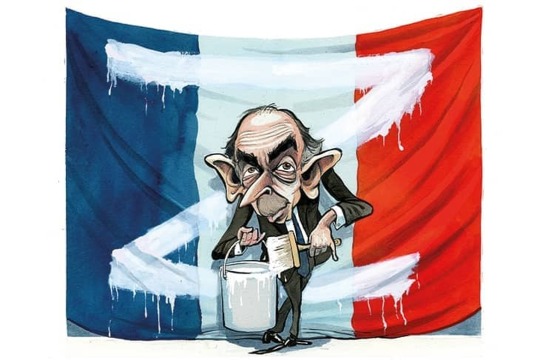
Zemmour, or Le Z as he’s sometimes known, has for some years been a leading public intellectual in France, a popular historian as well as a television provocateur, and one of the country’s most famous journalists. Zemmour came to national pre-eminence when he was given his own daily debating show two years ago by CNEWS, a rolling news TV cable station which was re-inventing itself as the French Fox News. CNEWS’s ratings shot up, overtaking its CNN-like rival BFMTV.
Le Z’s style, however, couldn’t be further from Trump’s. “Unlike my rivals, I write all my own books,” he jokes. He is highly cultured, even if critics might argue that his erudition is preserved in aspic: he quotes 18th-century philosophers and 19th-century historians, with nary a concession to popular topics (he likes football and The Rolling Stones). He litters his speech with great quotes: ‘As Victor Hugo said… As Voltaire said… As Chateaubriand said…’
He speaks in newspaper columns: press his opinion button and he’s off. His eloquence is, and even his critics agree, almost hypnotic. “Je comprends rien à ce qu’il raconte, mais il parle drôlement bien,” is a typical reaction to a Jacques Bainville - and Charles Maurras - quoting tirade by Le Z. His style and accent are demotic, his sentences are clear and his opinions trenchant. In a country where columnists, even in tabloids, prefer weighty circumlocutions to punchlines, this singles Zemmour out.
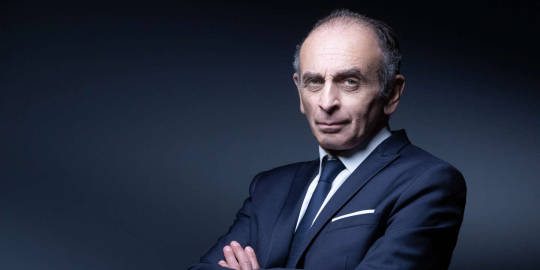
Zemmour, much like other disruptive populist figures, appeals to those voters (and those given up on voting) who had despaired of ever finding a candidate expressing their concerns. He speaks to their fears: the loss of French identity and rising insecurity caused, he believes, by unchecked immigration. His books, which have sold in the hundreds of thousands, compare a rose-tinted past Republic, where teachers were respected, fathers held solid jobs, families stayed together and classical culture wasn’t derided as pale and stale.
This fits French particularism: Les Déplorables here rarely object to cultural literacy, as long as they don’t feel it’s used to belittle them, Énarque-style. Emmanuel Macron specialises in such elitist putdowns as he was, like every other French president (with the exception of Sarkozy, son of Hungarian immigrants), educated at the highly competitive Grande Ecoles and especially the L'École nationale d'administration (ENA) that churned out a conveyor belt of political leaders (left and right) and captains of industry. ENA may have gone now (as of Dec 2021) but the elitist snark hasn’t.
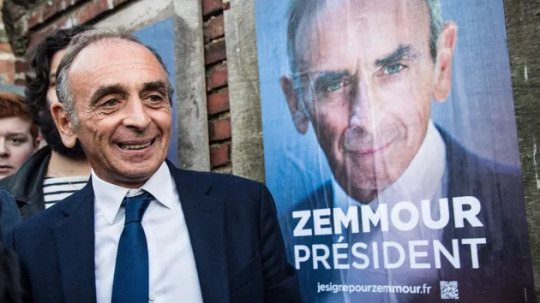
Zemmour is both clever and cultured and yet never talks down to people as Macron does - Macron once favourably compared himself as a Jupiter benevolently looking down on his children. Zemmour relishes dropping live grenades in any debate. His first polemical essay (he’d already written a number of political biographies, including one of Jacques Chirac), published in 2006, was called Le Premier Sexe, in clear reference to Simone de Beauvoir’s 1949 The Second Sex. It bemoaned the “feminisation” of values, and whenever talking about it Zemmour never shied from adding fuel to the fire. “How did women enter the National Assembly and the Senate? Through parity laws that forced parties to select them. And I need not tell you how they were picked… They put in friends, wives, mistresses, etc.”
He believes in the “Great Replacement” theory: he described in his Le Figaro column those areas in Paris where “one feels best, physically, the disappearance of the French population […] while, coming from the suburbs, at the end of a long journey from the depths of Africa, an Arab-Muslim people has replaced the former inhabitants.” He has continually hammered home his idea that foreign immigrants to France should give at least one “traditional” French first name to their children, drawn from the Catholic saints’ calendar, helping them to assimilate better into French society. “Your parents should have called you Corinne,” he told the television personality Hapsatou Sy, born near Paris of Senegalese parents. In Zemmour’s France, no one should ever be called Mohammad or any Anglo-American name, it’s just isn’t French and it will not do.
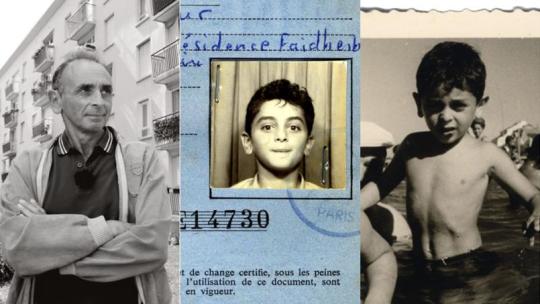
Might his preoccupations with national characteristics, the greatness of French literature and the collapse of western civilisation have something to do with the fact that he is himself an immigrant child? There is truth in this. The Paris-born Éric Justin Léon Zemmour, son of French-Algerian Berber Jews who had to leave Algeria in the Fifties during the independence war, harks back to the old French Républicain model of “assimilation” rather than of “integration”. “I’m a Frenchman of Berber origin,” he says. His grandfather spoke better Arabic than French. His father drove an ambulance. ‘What my family has done in terms of assimilating French culture should be an example,’ he says, proudly. ‘I am a product of French colonialisation. I am not one of these people who condemn the French coloniser. I say thank you.”
His peculiar brand of nostalgia dovetails with the long-standing history of France as a country of immigration, that, until recently, seamlessly crafted Frenchmen and women from anyone who wanted to become French. This approach proved successful for centuries. So much so that the character who most defines, fondly, the French foibles, Astérix the Gaul, was created by the sons of immigrants: René Goscinny, a Polish-Argentinian Jew, and Albert Uderzo, an Italian builder’s son. (Another Italian builder’s son, François Cavanna, founded Charlie Hebdo.) This resonates with Zemmour’s audiences, who smart from being hectored by increasingly woke New York Times journalists shrieking that France is a country riven by structural racism (which it isn’t but one that persists in the victimhood fantasies of the militant woke left).
Zemmour has used his personal Jewish story as a shield while positing particularly contentious theories, such as his idea that Marshall Pétain, the President of the puppet Vichy régime under German Occupation, “made a pact with the Devil, allowing the Nazis to deport foreign Jews in France in order to save French Jews”. This is a known far-Right trope in a country that carries the complicated trauma of the Collaboration.
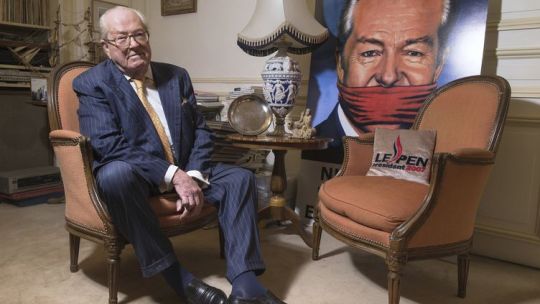
It’s hard not to see here the influence of the old Jean-Marie Le Pen, founder of the National Front, now 93, whom Zemmour used to regularly visit in his Château de Montretout lair just outside Paris for long, lively discussions. Le Pen, who was fired from his own party by his daughter, Marine le Pen, himself joined the Resistance for a few weeks in 1944, aged 18. But he’s specialised in obsessive remarks about the Holocaust ever since. He is more of a provocateur than a dyed in the wool anti-Semite and probably helped cultivate Zemmour’s own taste for scandalous statements.
Le Pen was never forgiven in France for his provocations; hence his own daughter’s symbolic parricide. But what is interesting about Zemmour is that, like Boris Johnson or a Donald Trump, his mounting crowd of partisans discount his verbal excesses as just “Le Z being le Z” - except among the Parisian chattering classes, whom he enrages. This, of course, serves him.
I hosted a dinner with my French partner just before Christmas and we had a few friends around - an eclectic group drawn from history academia, journalism (left and right), politics (advisors to two main parties), book publishing, art gallery world, the army, and business. Some were from polar opposites of the political spectrum and others were apolitically indifferent. Nevertheless we enjoyed the conviviality of good conversation over fine wine and a meal I cooked (thankfully no one died from food poisoning).
Whether they were traditional Catholic, or conservative royalist, or secular Jewish, or just left leaning woke, they all found it both amusing and ironic to see their France, that old Gallo-Roman country, the Church’s eldest daughter, rely on a Jew - traditionally scapegoated in French history - to fulfil the threefold mission of eulogising France’s lost greatness, bemoaning its besmirched identity, and proudly raising its old standard once more. At times, it felt Zemmour was the new Joan of Arc. It was he who was holding the sword others had dropped and rallying the troops for battle.
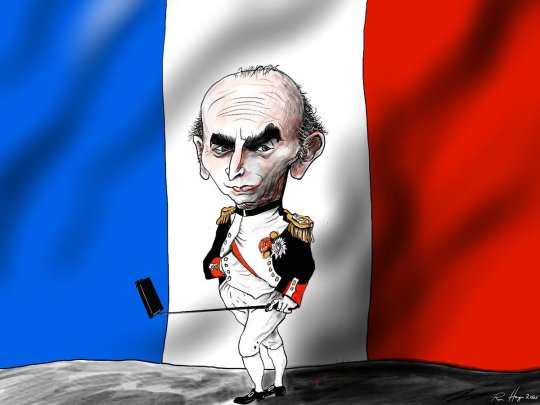
We agreed that Zemmour’s historical mission, as he sees it, is to reconcile the patriotic bourgeoisie and the working classes, almost like a Napoleon.
In concrete terms, this means that he was betting simultaneously - and this is difficult - on both traditional right-wing voters and supporters of the populist far-Right.
The fact that he is Jewish reassures the former group (“he can’t be a fascist so we can vote for him!”) The fact that he maligns Jews despite being one himself entices the latter (“there’s no way he’ll be bought off, we can trust him!”). The former bunch appreciate his harking back to author Charles Péguy and his admiration for De Gaulle. The latter like his scorn for Emile Zola and his rehabilitation of Pétain. It’s a mish mash that insulates him.
As someone archly pointed out at our dinner, unlike Henry IV, the French Renaissance King who was born a Protestant, Zemmour won’t have to reason that “Paris is well worth a mass.” Historically, he is perhaps in the tradition of Arthur Meyer, the editor of the Gaulois newspaper, who converted to Catholicism in 1901. He also borrows from Edmond Bloch, who rubbed shoulders with the French far-Right in the 1930s and also ended up converting to Catholicism. But Zemmour, who aspires to lasting renown where these two predecessors enjoyed only passing notoriety, will not have to follow them to some kind of Christian conversion. Far from being a hindrance to his irresistible rise, his Jewishness is his trump card. Let’s be frank, lamented one secular Jewish friend, a leftist journalist, said at our dinner: this is both masterful and unprecedented.
What he has achieved, as we all agreed, is in putting the three ‘I’ concerns of his potential voters - immigration, identity and insecurity - at the centre of the political discourse.
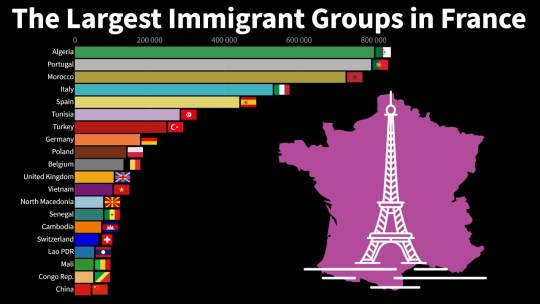
But thinking further upon it, I would add another ‘I’ that I found just as intriguing as an observer: the individual.
I’ve noticed when Zemmour incisively dissects Macron, he doesn’t go after his policies but what lies behind them. Macron, he claims, is gripped by ‘an individualistic ideology. He thinks every individual is basically the same and can live everywhere. Of course, he will enforce rules here and there, but fundamentally…the existence of peoples to him seems outdated.’
Zemmour doesn’t go for the obvious link and decry Macron for copying the economic liberalism of Thatcher and Reagan that fuelled excessive individualism that Macron champions. For Zemmour it’s “….more a deviation from Christian humanism. As Chesterton said: “It’s Christian virtues gone mad.”’
Western societies, Zemmour suggests, have ‘simply forgotten that in Christian humanism there is indeed the respect for the individual but that is rooted in a culture, a religion, a people, a land… [today] we have the individual who is sacred, very well, but who is completely isolated from his people, his historical context, his customs. You see it is believed that individuals are interchangeable, that they are only consumers. It’s an economistic view that I don’t share. I think that people are first of all a product of their culture, their people, their customs.’
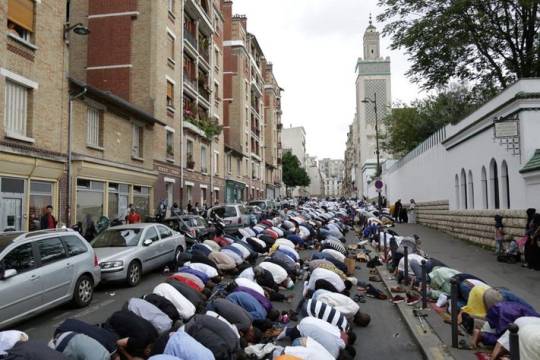
Zemmour prefers the English word ‘globalisation’ to the French ‘mondialisation’ to describe this process. ‘It’s an alliance of left and right,’ he says. ‘Above all it is cowardice.’ By that he means that European leaders have been weak in refusing to tackle the social and political ills concomitant with globalisation. He has said, “For 40 years they’ve been afraid to confront the politically correct, afraid of riots in suburbs, afraid of being seen in a bad light by the media, afraid of not obeying the judges.”
For Zemmour, the most craven expression of this hyper-individualism is militant political correctness - ‘le wokeisme’. He calls it, “hypersensitivity to the rights of the individual, a generalised offensive against French and western culture, against the white heterosexual man. These people want above all to make the French and all westerners feel guilty, ashamed of their history, so that they amputate themselves, destroy themselves, abandon their culture, their civilisation, simply so that they no longer feel guilty.” This wokeness, he argues, is a kind of Trojan horse for the Islamification of formerly Christian nations, “It is by destroying our cultures, our history, that they make a clean sweep of all that and allow a foreign culture, history and civilisation to come and replace it.”

Such talk - echoing as it does ‘the great replacement theory’ of Renaud Camus - causes consternation in progressive circles with the tired finger pointing trope of ‘white supremacy!’ Yet this unfazes Zemmour. He goes on to say, “I think that nations are the pinnacle of civilisation. I like the differences of nations. I like the fact that the English are very different from the French, just as they are very different from the Germans. The great tragedy of globalisation is that previously there were nations that were different to each other and within each nation there was a great cultural coherence.”
Such talk resonates amongst a large cross section of people from different walks of life. His words touches a very deep anguish in the hearts of many. It’s a pessimistic vision, declinist if you will, but many have argued, not unfounded. In a country with the largest populations in western Europe of both Muslims and Jews, Zemmour’s inflammatory language and his talent for setting the agenda have been regarded as extremely dangerous on the left and in the centre of French politics - particularly since he has won the support of supposedly centre-right voters long wary of Marine Le Pen. To the leftists, they argue he has succeeded in making Le Pen and her Rassemblement National party seem almost moderate.
Given certain conditions, and with a little luck, he would be in a position to do what both Le Pens failed to do, namely to seduce republican voters without alienating anti-republican voters, and vice-versa. He would be in a position to shatter - or at least crack - the “glass ceiling” which has kept the far-Right out of power for so long. He would achieve this thanks to his patter, his strategic know-how and his stubbornness. But it would also be in part thanks to his Jewishness, which makes it impossible to call him a Nazi or a fascist. It gives him more leeway on everything controversial.
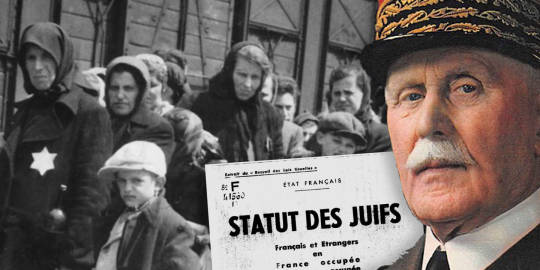
Indeed Zemmour has repeatedly run foul of France’s strict laws against inciting racial or religious hatred and allegedly denying the Holocaust, and has been accused in 16 such legal cases over the years, according to his lawyer. But he has prevailed in most of them, often using a free speech defence, and he argues that he is being targeted for politically incorrect views. As polarising as he is, there is something genuinely authentic about him that many, who have been let down by professional politicians on both left and right time and time again, find very attractive.
An outsider might be forgiven in assuming that Zemmour’s support comes from the non-university educated and the working class. But that is a mistake. Zemmour is not Trump. Outsiders, especially in the US where everyone sees anything on the right through Trumpian lens.
Zemmour is a completely different animal from Trump. Zemmour is well read; he actually dives deep into complex topics like economics. Trump, needless to say can barely read a 3 bullet point brief before being bored.
The socio-economic profile of his supporters is also very different. The socio-economic category doesn’t seem very predictive of voting intentions for Zemmour. Zemmour has attracted a lot of talented professionals. Most people don’t know them, because they mostly work in the shadows, but Zemmour is surrounded by a lot of people with a very unusual background for a candidate regarded as far-right. They tend to be young and come from the most prestigious schools in France. There are engineers, public servants, people in business, white collar middle class professionals etc.
Those profiles are very different from the crackpots who advise Le Pen. Overall it is not easy to pin Zemmour down or his supporters.
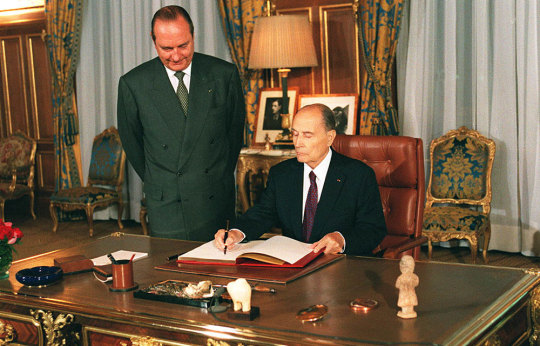
Zemmour has been very explicit about his strategy, so we don’t really have to guess, but in order to understand it you need to know a few things about French political history.
Up until the 1980’s, the French socialist party was a working-class movement. François Mitterrand, the first socialist to become president in France, was elected in 1981 on a platform that included the nationalisation of many branches of industry. He actually implemented this platform after his election, but it was a disaster and he soon had to choose between his socialist economic policy and European integration, because continuing with this policy would have required that France leave the European Monetary System. In 1983, he chose the latter, but this decision created a serious political problem for him. Indeed, if the socialist party was no longer socialist on the economy, it needed something to mobilise voters against the right.
The solution was to pivot from a party that was focused on improving the material conditions of the working class to a party that was focused on social issues and, in particular, on defending immigrants, who gradually replaced the working class in left-wing mythology. (Of course, I’m not saying it wouldn’t have happened otherwise since left-wing parties in other Western countries underwent the same transformation, but it was particularly sharp in France.) Luckily for Mitterrand, at the same time, the National Front, Jean-Marie Le Pen’s far-right party, was beginning to rise and its leader was the perfect bogeyman for the socialist party and its new platform.
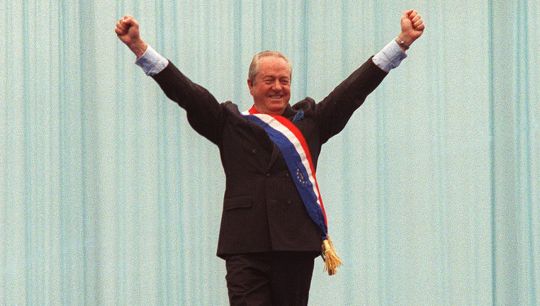
At first, traditional right-wing leaders did not consider the National Front to be toxic and even made alliances with it occasionally in local elections, but as it turned out Mitterrand was really smart and traditional right-wing leaders were really stupid. Mitterrand very intelligently used his influence to simultaneously give more visibility to Le Pen by getting him invited on national television and also demonise him by supporting various anti-racist activist groups to make him a pariah by pretending that he was a fascist. Thus, while the National Front was rising and taking votes away from traditional right-wing parties, it was becoming increasingly difficult for them to make alliances because mainstream conservative politicians were afraid of the backlash from the media.
Le Pen himself made that easier by making several very controversial statements and soon he was completely toxic. This gradually resulted in a division of the French right, with moderates and the conservative bourgeoisie voting mostly for traditional right-wing parties, while the National Front got more radical voters and, increasingly, working-class voters moving away from the communist party. Despite what many people in the US think, France is actually a deeply right-wing country in many ways, so the total vote in favour of the right is almost always greater than the total for the left, but this division of the right and the “cordon sanitaire” around the National Front nevertheless allowed the socialist party to sometimes win national election because the right couldn’t unite.
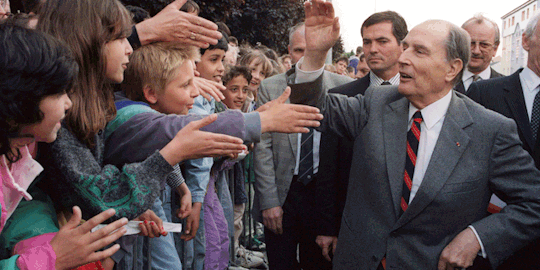
This coup was a case of political genius on the part of Mitterrand and, for the past 30 years, it has plagued the French right and made it lose elections that it would otherwise have easily won. While this division of the right-wing electorate was initially pretty superficial, it eventually solidified because, to a large extent, people’s ideology is driven by their partisan identity and not the other way around. Thus, the more time went by, the more difficult it became for the right to escape Mitterrand’s curse by uniting.
Nicolas Sarkozy understood this and his solution was to steal Le Pen’s voters by adopting his platform while avoiding his excesses. Thus, he was able to unite the right without allying with the National Front, which allowed him to win the presidential election easily in 2007. But he quickly betrayed his promises and, under Marine Le Pen, the National Front - which later became the National Rally - rose even higher than it had under her father. However, despite her efforts, it’s still toxic enough that she can’t possibly win the presidential election.
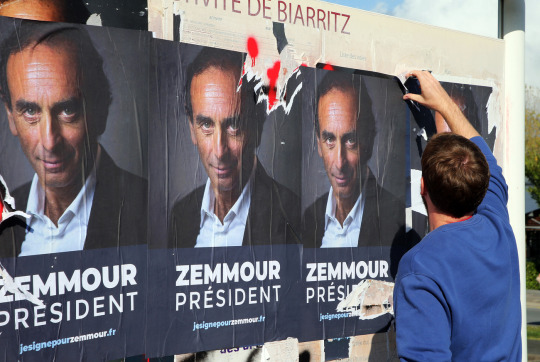
How does this history lesson relate to Zemmour?
Zemmour’s theory is that he can unite the right around him by bringing together the conservative bourgeoisie that currently votes for traditional right-wing parties and the working class who vote for Le Pen. Many people are surprised that his economic platform is not more “populist” and they think it’s because he lacks imagination, but they just don’t understand that he is doing that on purpose, because he doesn’t want to scare the conservative bourgeoisie. At least, he is hoping that he can take enough voters on both sides to reach the second round of the presidential election, which unlike Le Pen he would have a chance of winning because - at least that’s what he thinks - he is not as toxic as her.
Is he right? That’s hard to say.
So far, he is doing worse in the polls than Le Pen when they test them against Macron in the second round, but I have a hard time believing that Zemmour could be as toxic as Le Pen after decades of nonstop demonising of her controversial family. I suspect that it will change as the campaign hots up in the coming months and people who don’t follow politics closely get exposed to him. However, this won’t matter if he doesn’t make it to the second round, and while it’s still unclear whether he will at this point he has been doing spectacularly well so far.
But what is crystal clear is that neither can beat Macron.

The only way the far right can beat Macron is for both Zemmour and Le Pen to come together. Politically, an alliance would make sense. The National Rally boasts a very strong following among the working classes, who feel short-changed by globalisation. Zemmour attracts wealthy voters who want to defend the nation state and family values against immigration. But a Le Pen-Zemmour ticket at this point seems like a very long shot, not least because the far right duo appear to hate each other. Not a day goes by without Zemmour attacking Le Pen, and vice versa. Le Pen in particular has been reported to be livid at Zemmour stealing her thunder. Despite both sides having some back channel between them, nothing has come of it.
Le Pen doesn’t even trust her own party. It’s been reported that there are a sizeable number in the upper echelons of her party who are unhappy with her leadership and are actually drawn to Zemmour’s more purist call to action. If she shows signs of faltering they may well turn on her. Some of her supporters are speculating on a reconfiguration of the far right as the race between Le Pen and Zemmour heats up. If Zemmour succeeds it raises the question as to whether parts of Le Pen’s National Rally party joins Zemmour’s troops or whether they stay put and try to influence Zemmour.
The brutal reality is that if Le Pen and Zemmour don’t join forces, they could scupper each other’s hopes to even make it past the first round. In the French political system, the two candidates with the most votes in the first round of voting face off in a run-off. Both Zemmour and Le Pen run the risk of splitting the far-right vote and canceling each other out and thus playing into Macron’s hands.
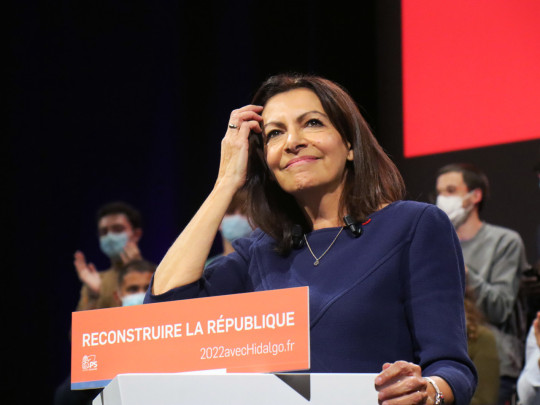
As for the left, they are resigned to being left behind.
Ahead of France’s April 2022 presidential elections, all three major left-wing candidates are performing badly in the polls as they struggle to gain traction outside big cities amid a shift to the right among the French electorate.
One of the French language’s most striking expressions is le detail qui tue – the small, devastating detail - that says it all. A perfect example can be found in a 2019 Le Monde series on the alarming decline of France’s Parti Socialiste (PS). Acute financial difficulties had forced the once august vehicle of the French left to sell its exquisite headquarters in central Paris and move to the suburbs. When the Le Monde journalists went to the new headquarters it was so obscure that their Uber driver’s GPS could not find it. They eventually found the party HQ “at the far end” of a “small, anonymous courtyard that turned out to be a company’s parking lot”.
As campaigning has begun for the 2022 French presidential elections, the Socialists' fortunes have not improved. PS candidate Anne Hidalgo is at just 5 percent of voting intentions, according to Politico’s polling aggregate - even less than the 6 percent drubbing PS’s Benoît Hamon got in the first round of the 2017 presidential elections.
Hidalgo has also been accused of failing to deliver on the most basic environmental task: keeping the city clean. The hashtag #saccageparis has gone viral over recent months as Parisians have inundated Twitter with photos of rubbish piled in the streets and floating in Paris’s usually idyllic river and canals.
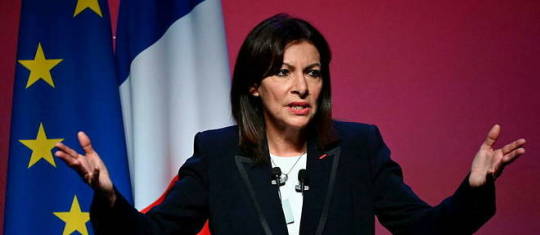
What is more, her transport policies made her the bête noire of many motorists – a risky group to antagonise in France, since the Macron government was famously rocked by the Gilet Jaunes (Yellow Vests) protests that erupted over his 2018 petrol price hikes.
Many in Paris - even on the left - think she’s gone too far in her war against cars. It also doesn’t goes down well in the rest of France, especially after what everyone saw in the Gilet Jaunes crisis when it seemed like politicians didn’t understand how low-income voters in suburban and rural areas really depend on cars.
Hidalgo has three fundamental weaknesses that she has been unable to overcome. A Parisian image that does not travel well in the provinces; an approach to governing Paris that has been deeply divisive, especially on environmental initiatives; and, most damagingly, a failure to offer a coherent and attractive policy platform.
Paris Mayor Hidalgo’s fellow leftist candidates are not faring much better.
The Greens have a similar problem gaining traction outside of metropolitan areas. EELV under Yannick Jadot won several major cities in the June 2020 local elections, although they have fared poorly outside of big conurbations.
Despite the illusion created by a Green surge in some cities in recent European and municipal elections, France beyond the ring-roads had never gone green. There is a problem of green politics seeming disconnected from working-class people’s lives.
The uncmfortable truth has been that the French left seems to have abandoned the most disadvantaged social classes. Jadot and Hidalgo are attracting far less support among the working class than among the managerial classes. The green EELV’s Yannick Jadot is at 7 percent.
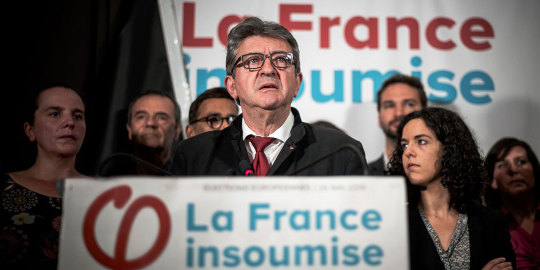
Jean-Luc Mélenchon is the one leftist candidate with any significant appeal among France’s working class. The extreme far-left France Unbowed (La France Insoumise) party firebrand is at 10 percent – a far cry from the nearly 20 percent he reached in the 2017 vote.
However the veteran extreme-left candidate has been increasingly losing his marbles with the onset of age. He’s gone from firebrand Communist to conspiracist over recent years – most recently in June when he predicted that, “in the last weeks of the presidential campaign, we’ll have a serious incident or a murder” orchestrated to manipulate the electorate. The French presidential elections have already been “written in advance”, Mélenchon went on – suggesting that Macron was the creation of a nebulous elite cabal: “In every country in the world, they’ve invented someone like him, who comes from nowhere and who’s pushed forward by the oligarchy.”
This comes after Mélenchon’s notorious proclamation in late 2018, when police searched his home and the France Unbowed party HQ as part of an inquiry into alleged financial impropriety. A video went viral of him shouting at the officers: “I am an MP! […] I am the Republic!” Mélenchon’s taste for conspiracy theories, ready rants and aggressive anti-European stance go down less well among the French public at large than among his party faithful.
Never before has the French left polled so badly at this point in the electoral cycle and never before have they become irrelevant to the public discourse on things that really matter to people.
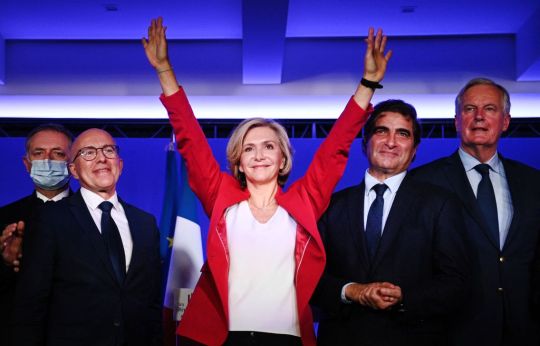
But what of the conservative and the right in France?
In December 2020, France's conservative party, Les Républicains (LR), chose Valérie Pécresse to challenge Macron, a choice that has already had a major influence on the shape of the campaign.
Valérie Pécresse, is LR’s first-ever female presidential candidate - and if she succeeds, she would become France's first woman head of state. Les Republicains, which traces its origins to Charles de Gaulle, dominated French politics for much of the post-war era with Jacques Chirac and then Nicolas Sarkozy consolidating the hold conservative right had in power. But after Macron redrew the landscape in 2017, it has struggled to unite its centre-right and staunchly conservative factions.
Valérie Pécresse, 54, is the golden girl of French politics. It’s not for nothing she’s nicknamed by detractors as ‘the blonde’. But she is anything but an airhead blonde. She’s probably the most cleverest in the presidential field, including Macron.
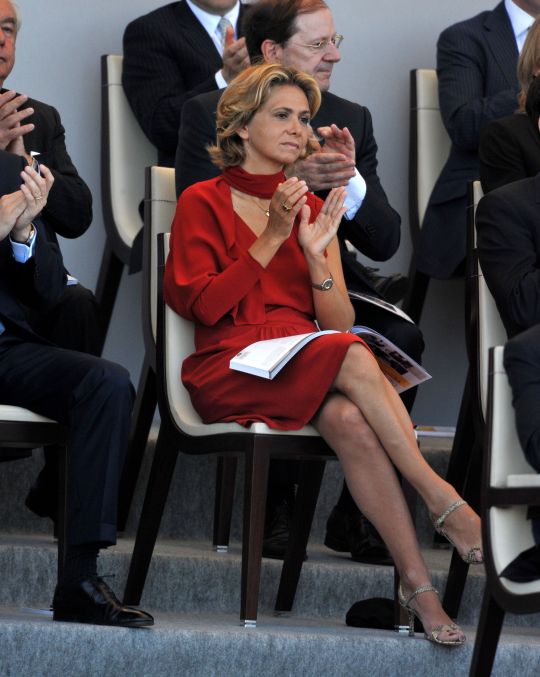
Pécresse, was born in the wealthy Paris suburb of Neuilly-sur-Seine, on the outskirts of the city boundary of Paris, where ex-President Nicolas Sarkozy was once the mayor. She grew up, as many girls do in Neuilly, as well turned out: never flashy but conservatively stylish, and never flaunting wealth or an intellectual family background. Such families were once called ‘BCBG’ - bon chic, bon genre - who lived in Neuilly or the western arrondissements of Paris.
I know her type because she reminds me in many ways of my French-Norwegian cousins who also were raised in Neuilly and exhibit the same cheerful, quietly determined, understated ‘BCGC’ look. This isn’t really surprising as they, like Pécresse, went to the same convent school in Neuilly. The dual aim of Sainte-Marie de Neuilly is to turn out faithful and traditional Catholics girls but also tough, intelligent young women capable of competing with men in a men’s world. My French-Norwegian cousins didn’t always enjoy their time there, but it educated them well and set them on a road to high academic achievement and very successful careers.
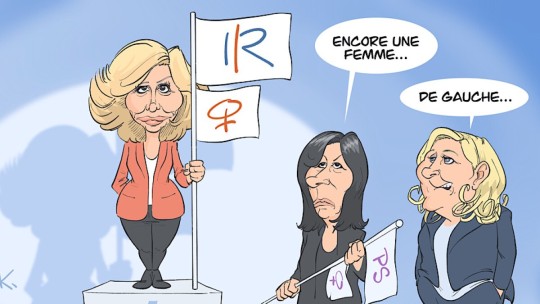
Pécresse is a role model for many young women like them. Pécresse is a graduate of the now-dissolved École Nationale d’Administration (ENA), the grande école and hothouse for the country’s political elite, finishing an impressive second in her class (a feat not matched by Macron or Hollande). Even before then she had been a brilliant student, passing her baccalauréat at 16, two years early, and learning Russian at 15 while spending time at young communist camps in what was the Soviet Union. She saw for herself how pernicious communism system was and it led her to become a moderate conservative upon her return.
She is currently president of the Île-de-France regional council, which includes Paris. Pecresse had pointed to the cutting of hundreds of jobs at her head office to make way for more high-school staff, reduced spending and higher investment as proof she gets things done. In 2020, she won a second mandate to run the greater Paris region. Not only has she had running things on a regional level (where there is more opportunity for impact), she has government experience. She served as a very able budget minister and forged a reputation as a strong no-nonsense higher education minister during Nicolas Sarkozy’s 2007-12 presidency.

Opponents who had nicknamed her "the blond" had paid the price, she said. Asked if France was ready for a woman president, she replied: "Voters on the right have shown they're ready, and they can be the most reticent to trust a woman."
Ten years ago, being the candidate for Les Républicains would have made Pécresse one of the favourites, even the favourite, to be the next President. But life is more complicated now - and it is growing more complicated by the day: part of the centre-right has emigrated to President Emmanuel Macron, while other sections have shifted to the two far-Right candidates, Marine Le Pen and Éric Zemmour.
During the party’s primary campaign, the main Les Républicains candidates veered from the party’s traditional centre-right territory towards the far right. Ciotti, leader of the hard right wing of the party, declared that he would hold a referendum to stop mass immigration and set up a “French Guantánamo Bay” to deal with terrorism.
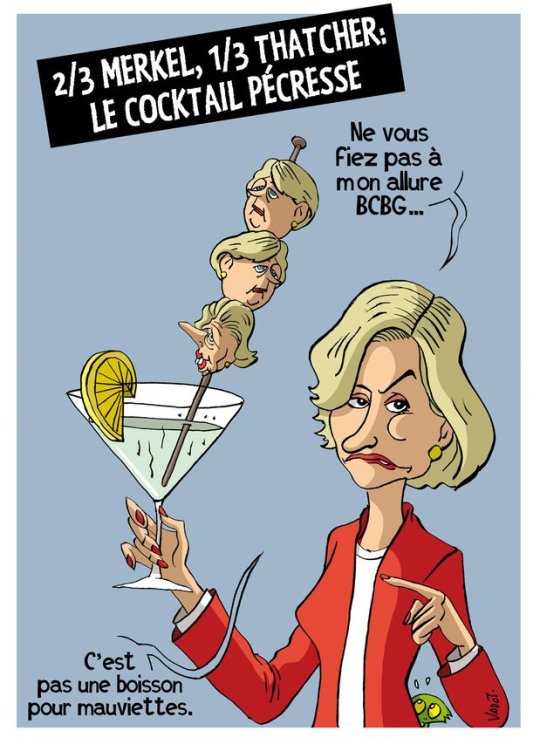
Pécresse, who has described herself as “two-thirds Angela Merkel and one-third Margaret Thatcher”, had argued she was the candidate with the experience and prominence to take on Macron. As education minister, she faced down long-running street protests and university sit-ins to force through reforms to higher education. As a former budget minister, she has, until now, been pro-European and moderate; she promised to focus on the economy and on building consensus if she made it to the Élysée Palace, and also pledged to increase salaries and end the 35-hour maximum working week. She campaigned on promises to halve the number of residence permits for non-EU migrants, stiffen judicial sentences in tough neighbourhoods where police are under pressure, and ban women accompanying their children on school trips from wearing a Muslim headscarf.
That pitch was enough to get her over the line and win her bitterly divided party’s candidacy.
The response by harder-line Républicains or by Zemmouristes to her victory was brutal. They called her a “girouette” (weather-vane), “Valérie Princesse”, “Valérie Traitresse” and “Macron in a skirt”. Indeed the immediate aftermath of Pécresse’s victory, Zemmour made an open pitch to disappointed Ciotti supporters to join his far right movement. As a further sign of his seriousness, he appointed the aristocratic Breton general Bertrand de la Chesnais as his campaign manager, a much respected army general. In doing so, Zemmour showed he had the power to drag the centre-Right rightwards as he does to splinter the hard and far-Right.
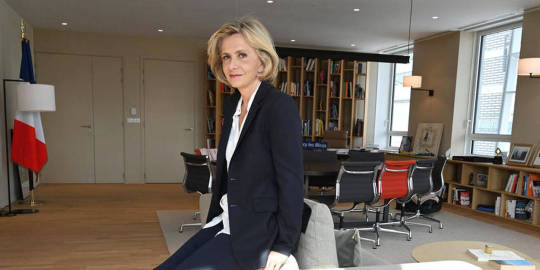
However Valérie Pécresse didn’t get to where she is by letting moss grow under her feet.
Pécresse has toughened her language on immigration and identity, seeking to neutralise the threat from Le Pen and Zemmour, whose promise to "save France" from Islam has polarised France. She says she would end the automatic right to French citizenship for people born in France and stiffen judicial sentences in places where police have lost control. On a table in Pecresse's office sits a photograph of Samuel Paty, the teacher decapitated by a Chechen-born teenager in a suburb of Paris in 2020 because he used caricatures of the Prophet Mohammad in a lesson on free speech. Pecresse said the teacher's portrait would follow her to the Elysee Palace if she won the election. "We have to be unbending in the respect of our values," Pecresse said. "In the public space, the law comes before faith. It's the same rights, the same duties for all."
Still, she has her work cut out for her if wants to presents herself as a voice of moderation, both within her party and to the public who are anti-Macron but can’t decide who’s is better placed to defeat Macron.
Pécresse for her part scarcely ever mentions either of her right wing rivals. All her criticism is aimed at Macron, who is floating up to 10 points ahead of the field in the opinion polls. And so far it seems to be working. Recent polls show Valérie Pécresse from the conservative Les Républicains party is in the ascendant. Pécresse could run French President Emmanuel Macron close in the second round of this year's election if she can squeeze past right-wing rivals in round one. So far she has cleverly taken a leaf out of Macron’s playbook and tried to appropriate Zemmour’s language to win over his supporters.

Pécresse put on a show of strength by unveiling her campaign politburo, including two of the men she defeated in the party primary on 4 December. They included the hard-Right parliamentarian, Eric Ciotti, who makes no secret of his admiration for Zemmour. They also included the former EU Brexit negotiator, Michel Barnier. She called them “my great army of conquest to serve France”. “Grande Armée” was a reference to the Emperor Napoleon while “conquest” was a reference to Zemmour’s new anti-migration, anti-Islam, Europhobic party, “Reconquête”.
Moderate members of Les Républicains have been unhappy with Pécresse’s first couple months of campaigning. They fear that, far from proving an inspired general, she has been taken captive by the Right wing of her own army. That, they fear, will make it harder to ‘reconquer’ the parts of the centre-Right vote which deserted her party for Macron in 2017 - and the many other moderate voters who are tempted to stick with the President this year.
Other party insiders say that Pécresse has no choice but to campaign to the Right to push ahead of Le Pen and Zemmour in Round One and claim one of the two places in the run-off. Most recent polls place her neck and neck with Le Pen on 16%, with Zemmour just behind and Macron 7 to 10 points ahead. If she reaches the second round, many seasoned political observers believe she could win.
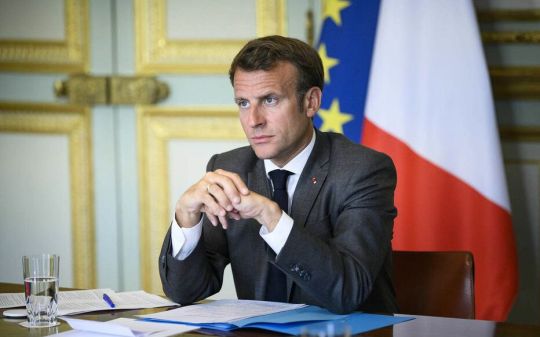
President Macron has not been idle and has been alert to the danger that Pécresse presents.
In the past month or so he has been making headlines with a couple of controversial things. He ordered the European Union flag to fly solo under the sacred arch of the Arc de Triomphe, where traditionally a French flag has flown. He also gave an explosive interview where he declared that he wanted to “emmerder” (piss off) the 8% of non-vaccinated French and make their lives impossible by forcing them out of cafés, restaurants, cinemas, and other public places if they are not vaccinated.
There were several reasons why Macron approved the solo appearance of the EU flag on the Arc to mark the beginning of France’s six months presidency of the EU council. There were several reasons why he abandoned presidential decorum and said that his government’s anti-Covid strategy was to harass and “piss off” the non-vaccinated.
To those watching closely it was clear that much of the guile behind Macron’s actions was aimed at Pécresse. He is doing all he can - with some success - to place explosive charges in the fault lines of her party and to widen the splits in the traditional centre right. It is no coincidence that both actions caused some embarrassment for Pécresse, who continues to struggle to hold together the two wings of her party: the moderate conservative, pro-Europeans and the hard-line, nationalist and populists.
Pécresse was obliged to follow Le Pen and Zemmour in making a fuss about the flag, unsettling the moderate pro-Europeans. She felt obliged - despite Macron’s uncouth description of his strategy - to continue her support for the government’s proposed, tougher “vaccine pass”, which will deny all fun and travel to the unvaxxed. That threatens to anger the libertarian and populist sections of Les Républicains.

Macron’s manoeuvres in recent weeks suggest that the President will do all that he can in the next 100 days or so to split Les Républicains and embarrass Pécresse.
Éric Zemmour’s entrance into the presidential race has taken the direction of French politics further right than it has been in many decades. No one disagrees with that. It is also true that the next presidential election will be fought on the political playing field largely determined by Zemmour’s ideas of how to restore France to her former glory. So the table is set but Zemmour might not even get a seat at the table. In other words, the political playing field may yet be barred for Eric Zemmour. There is every chance he may not be able to even be allowed to stand for President du to the ‘parrainage’ rule.
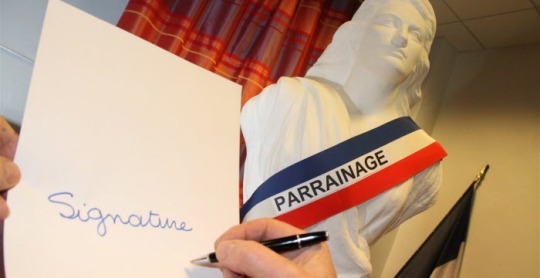
In France, to stand as a presidential candidate, you need to gather at least 500 signatures of support (or parrainages) from elected representatives like councillors, mayors, MPs and senators. The purpose of the parrainages system is to ensure that candidates have at least some level of support across the country before entering the race. In the French system, these signatures must be drawn from at least 30 different départements (regions), with no more than 50 signatures coming from the same one.
This is easier said than done. It is surprising to learn that even Marine le Pen struggles to garner enough signatures to be eligible to run for office. She managed only 627 in 2017. This time around, far-right minded officials will have to decide between her and Zemmour - and they can only vote for one. Robert Ménard, the mayor of Béziers who has promised his parrainage to Marine Le Pen, has gone on record to state that Zemmour will struggle to attract support even from those who have pledged it already. Zemmour has said he’s has around 350 pledged to him but nothing concrete. But Ménard has said, “I know people who promised him their signatures and who will not give them. Today he will really struggle to have the 500 parrainages because of the harshness of his speeches. That will be very complicated for certain mayors.”
What makes it extra hard is a law passed in 2016 (thanks to ex-President Hollande) in which the Constitutional Council is obliged to publish a complete list detailing who elected officials give their signature to. In effect it means that many local officials are afraid to offer signatures of support out of fear of alienating their own voter base. In 2017, only 34 percent of elected officials offered their signature to hopeful candidates.
Critics say it is undemocratic because it limits opportunities for people outside of the established political class. Candidates from big parties that already have lots of elected representatives can generally rely on those officials to get them over the 500 mark. That may explain why other, non-mainstream candidates are also finding it difficult to hit the 500-person target, including far-right leader Marine Le Pen and hard-left figure Jean-Luc Melenchon. Zemmour has used the media to reach out and address the mayors around France and other eligible officials with a warning, “You have the power to give a voice to millions of French people. Use it. Help me. Do not allow yourselves to steal this election.”
Potential candidates have up until March 4th to collect the required signatures and submit proof to the Constitutional Council. The final list of presidential candidates is published on March 8th.

Meanwhile all the candidates of the centre-right are Zemmour-ising themselves. At least until they get past the first round and only two are left for the final run off. The true battle-within-the-battle of the French presidential election is already raging. It is not a battle of Left vs Right or even centre vs far Right. It is a battle of centre vs centre, between two versions of the post-war French political consensus.
The consensus amongst the many polls makes Macron the election's likely winner, in line with recent surveys that have shown his closest opponents failing to gather momentum despite criticism of Macron's Covid 19 policies. Various polls have shown Macron would get around 24% of votes in the first round of the election. Far-right politicians Marine Le Pen and Eric Zemmour and conservative Pécresse were generally all tied on 16%. Many of the polls also said Macron would win in April's run-off vote, estimating a margin of 51-49% if he faces Pécresse, 55-45% against Le Pen, and 61-39% against Zemmour.
The election is, of course, still a long way away. Opinion polls bounces come and go. Just ask Eric Zemmour, who is sinking steadily after surging from 0% to 19%. The only exception to this rule seems to be President Macron, who continues to float serenely ahead of the pack on 23 to 25%.
All the same, Macron and his chieftains and supporters remain worried. They are confident that the President would beat either Le Pen or Zemmour if they reached the second round. They are far less certain that he would beat Pécresse. They know fully well that she appeals to a chunk of the electorate which dislikes Macron and would like a change, albeit not too much change. The prospect of a woman as President would, in itself, appeal to the perpetual French dissatisfaction with incumbents; there has been no female leader in France since the regent Marie de Médici four centuries ago.
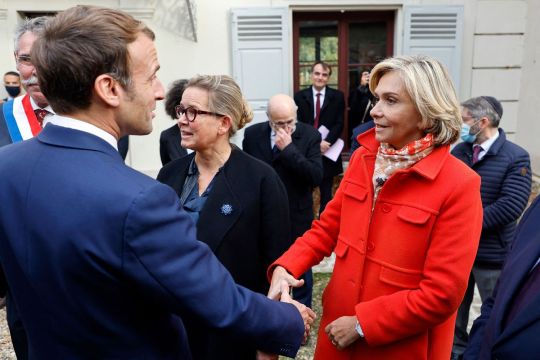
Pécresse, though more socially conservative and fiscally stringent than Macron, would also be more acceptable in a run-off to parts of the French Left - simply because she is not Macron.
Ultimately, in the first round, some of Pécresse’s advantages will become handicaps. A large part of the wider French right and even her own party want radical change on crime, migration and Europe. Pécresse may be more socially conservative than Macron: she was once a leading figure in a movement to try to block gay marriage, though she now accepts “marriage for all” should not be challenged.
But the French Right regard Pécresse, correctly, as a continuation of the centrist consensus which has survived, with a few twists and turns, from Chirac through Sarkozy, François Hollande and Macron. And unlike Le Pen and Zemmour, Pécresse is a typical product of the French political elite (Sarkozy the only one who wasn’t churned out by the École Nationale d’Administration (ENA) - this pisses off as many people as it reassures many others in tackling deep rooted problems France faces. It’s a very real case of ‘plus ça change, plus c'est la même chose’ (the more things change, the more they stay the same).
What would that change in France? Perhaps not much. Pécresse would bring a change of style. She would be marginally tougher than Macron on migration. She would be less ambitious about France’s role in Europe and Europe’s role in the world. But the fundamentals would change little.

What of the far right?
All the indications are that Zemmour’s campaign will fall flat and fail this spring. His negative ratings have grown during the campaign. Does this mean Marine le Pen outlast Zemmour past the first round? Could she therefore beat President Emmanuel Macron in a two-way battle on 24 April? The polls suggest that she would get closer than she did in 2017 (66-34%) but Macron would win by 10-12 points.
Zemmour’s people though remain bullish about his chances this year. They see some of the political defections from Le Pen as proof that the campaign is about to swing back in his direction. They speak of further defections, this time from the centre-Right Les Républicains (LR). One reasonably senior centre-Right figure, Guillaume Peltier, a former vice president of the LR, has already joined Zemmour. But his move isn’t such a shock as he was previously a supporter of Le Pen. No core personalities from Les Républicains have moved into the Zemmour camp so far.
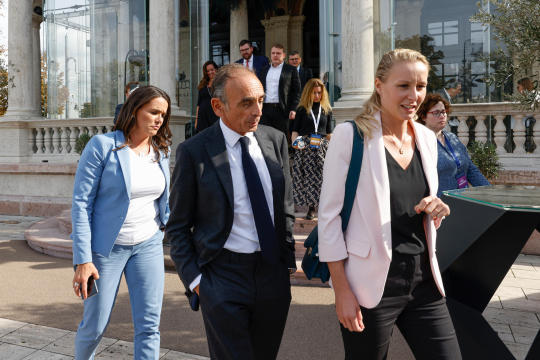
The next big political defection ironically could come once again from the Le Pen camp - or at least the Le Pen family. All eyes are on a possible pro-Zemmour declaration by Marine Le Pen’s estranged niece, Marion Maréchal. Maréchal, the grand-daughter of the far-Right patriarch Jean-Marie Le Pen, has split with her aunt Marine and stepped away from frontline politics to raise a family and become politcally active in civil society and re-brand herself as a traditional Catholic and social conservative. She also happens to be a friend of Zemmour.
Whatever happens I fear that the deep political divisions in France would persist; they might even deepen after the next presidential elections. The real battle for the soul of France is coming - but probably not until 2027.
In my humble opinion this election won’t really matter as much as the next one. If Macron wins it will be because many will have been holding their noses when they vote for him. There is every chance that his own party En Marche will be decimated and perhaps even cease to exist by the time Macron steps off the presidential stage. His party was built upon his cult of personality and now it’s a pile of sand ready to be washed away.
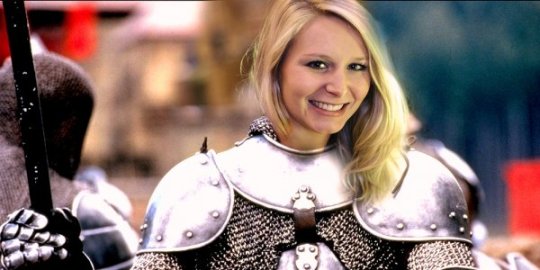
As we all know, like nature, politics abhors a vacuum. It’s the perfect stage for Marion Maréchal stake her claim for the presidency. Although only 32, she is seen by many people on the French Right and far-Right as the possible leader of a new nationalist-conservative movement which could mount a serious challenge for the presidency in five years’ time when she will just be 37 years old - although Valérie Pécresse will have something to say about that.
She is one to watch. Marion Maréchal was first elected to the French National Assembly in 2012 at the age of 22 as the member for Vaucluse’s 3rd constituency. She was one of the youngest parliamentarians in modern French political history and soon began to be seen as the rising star of the French right. Many see her as a far more interesting politician than her aunt, Marine le Pen.

But Maréchal disappointed many in 2017 by deciding not to seek re-election and resigning her position as regional councillor, stating that she wished to spend more time with her family. Her marriage to businessman Matthieu Decosse, which lasted two years, produced a daughter, who was then three years old. But Maréchal’s resignation from politics has not slowed her down. That same year, she helped found L’Incorrect, a conservative magazine that serves as an outlet for many of her conservative ideas.
In May 2018 she launched a private graduate school, the Institut de Sciences Sociales, Économiques et Politiques in Lyon. She has tried to open similar centres across Europe trying to equip the next generation into conservative public life.
Her personal story is messy but no one really care in France about such things. Her biological father, Roger Auque, who passed away in 2014, was a well-known journalist, diplomat, war correspondent, and Israeli spy. Maréchal’s paternity only came to light rather recently, and in 2013 Maréchal successfully sued L’Express newspaper for invasion of privacy for publishing these facts about her father, winning £7,200 in damages. Interestingly, her personal history has contributed to her pro-life convictions: in 2016, while opposing a law that would censor pro-life websites, she noted that “I am myself an accident.”
Maréchal is, in short, one of the most interesting people on the political scene today.
In her 2018 speech to CPAC (the American conference for conservatives), Maréchal had declared that “[w]ithout nation, and without family, the limits of the common good, natural law, and collective morality disappears, as the reign of egoism continues.” Rod Dreher, a noted American conservative writer, had noted that Maréchal was much more “traditionalist” than her American counterparts, “focusing on natural law, religion, and culture.”
She has declared that, “The project of the individual society … is still the subject of a consensus among the French ruling class. Almost all the media as well as a large part of the political world or corporations are united around the idea of progress. They share a childlike fascination for the future that drives them to wipe out the past. They share this tendency to abstraction, they despise the real world by subjecting reality to great ideological principles, [and] they continue to aim at universalism to the detriment of the particular and the local.”
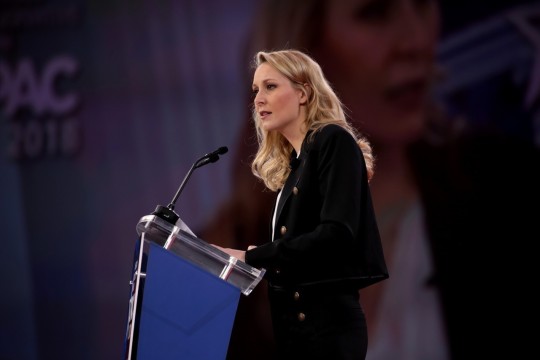
In Maréchal’s view, the media, politicians, and corporations are united around a “contractualist vision of the nation where the individual freely chooses his or her membership and transforms his or her desires into rights without any consideration for the community and the common good. They have all adhered to the relativism that denies the existence of a truth, the relativism that transforms principles into mere ‘values’ and morality into opinion.”
Interestingly, Maréchal pinpointed American progressives as part of the problem, noting that “our [French] elites” are particularly susceptible “to American influences,” especially with many of them increasingly receiving an education in the United States. As a result, these elites, she said, “are importing a model that until now was foreign to us: a racial vision of society. This is how we saw the ideas of ‘positive discrimination,’ ‘decolonialism,’ ‘white fragility,’ and quotas flourish everywhere in the public debate. This approach produces eternal victims, who by the mere fact of their origins are locked in resentment and a claiming posture that further dislocates the cohesion of the nation.”
The decline of religion has also contributed to social disintegration in France. “The Catholic Church, marginalized by the small number of practicing Catholics and by the profoundly anti-clerical DNA of the French left, no longer plays the role of cement in French society,” she told me. Additionally, “[t]he social fractures between metropolises and their peripheries, fuelled by crazy economic and land-use planning policies, are erecting an increasingly impenetrable wall between populations that no longer understand each other. All of these phenomena contribute to an increasingly individualistic and dislocated society.”
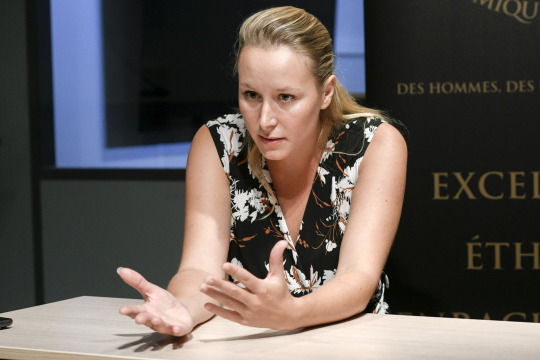
Add to that the fact that in France, “the Catholic religion has become a rather bourgeois religion with a predominantly left-wing Church (although it is more discreet on this subject today),” and “[t]he Church no longer plays a structuring role in French society.” Instead, Maréchal observed, “the popular religion is Islam or materialism. Let us add to this the existence of a form of anti-clericalism fueled by the French left and which has expressed itself exclusively against the Catholic religion since the revolution. This further reduces the Church’s authority or influence.”
Her words have electrified many social and religious conservatives who have felt uncomfortable with the Le Pen’s brand of political nationalism and also felt let down by Les Republicains. No wonder, political commentators suggest, she would have a credible shot at the presidency once Macron finishes his last term in five years time.
But five years is a long time away. Maréchal has no actual support to give other than her endorsement. That’s why a Marion declaration for Zemmour would not be enough to revive his campaign but it would almost certainly help her lay a marker down to his supporters for the future. It would be a political version of the celebrated sign at French railway level crossings. “Un train peut en cacher un autre. (One train can conceal the next.) ” One campaign can also conceal another.
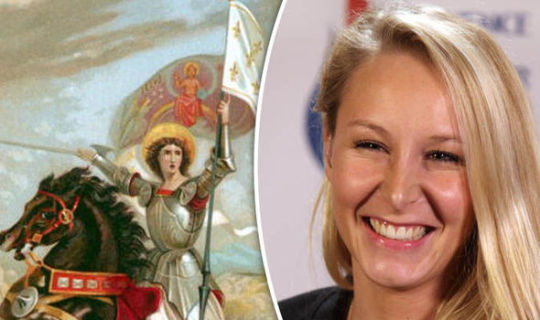
With my tongue firmly in my cheek I can wryly say that France might have the opportunity to elect its first woman president within this decade. Either this year with Valérie Pécresse as a reincarnated Marie de Medici or wait five years for Marion Maréchal as the self-styled second coming of Joan of Arc.
Ex-President Georges Pompidou said famously, “A statesman is a politician who places himself at the service of the nation. A politician is a statesman who places the nation at his service.” Let’s hope France elects the former and not the latter because as much as we Brits like to joke about the French we also recognise Europe is nothing without a strong and stable France.
#essay#postcard from paris#paris#france#french politics#politics#presidential elections#zemmour#precresse#le pen#macron#marion marechal#president macron#eric zemmour#valerie pecresse#marine le pen#conservatives#left#far right#immigration#society
86 notes
·
View notes
Note
In Germany a gay couple was attacked by a Muslim. One of them died, the media is more or less silent because they don't know what to say.
His motives are obvious, but nobody wants to speak it out loud. If it would be an old white man, the outrage would be huge. If it would have been a nazi there would be a funeral March. Am I the only one who thinks France is doing a great job after this brutal beheading of a teacher?
I just keep coming back to what Yasmine Mohammed said.
From: https://www.youtube.com/watch?v=KTIvCx4Y1ng :
(On silencing criticism of Islam with accusations of “Islamophobia”) “Yeah, it’s tiring. It is absolutely ridiculous. I feel like the double standard with speaking about Islam versus speaking about any other religion is just so nonsensical to me. And I feel like it comes from a place of people being scared of the bully.
‘These guys killed the Charlie Hebdo cartoonists, these guys are ISIS, these guys have their trucks of peace, these guys are bombing kids and Ariana Grande concerts, let’s not say anything about them, because we don’t want them to kill us.’
That’s not a good strategy. Since when has our response to bullies been ‘let’s just do whatever [they say].’ If your child has a bully taking their lunch money every day, are you gonna tell your kid ‘just give them your money every day, and just do whatever he wants, and never say anything bad about him.’ That’s not a good strategy.”
So, you’ve got a bully whose self-nominated representatives are completely prepared to kill you on its behalf, knowing with full certainty what it wants and why it wants it. This is “those who can make you believe absurdities can make you commit atrocities.”
Secondly, you’ve got a misguided sense of “tolerance” that turns a blind eye to Islam because of the thoroughly racist view that it’s brown people staunchly defending themselves from white colonizers from the US, France, Germany, etc. They echo the talking points: “Islam is a religion of peace!” “Nothing in the quran endorses this violence!” “They’re not a true Muslim!”. These are Enablers. Sometimes called useful idiots.
You can spot them on Twitter saying things like “how about we all just not draw Muhammad” when they’d never say the same thing about not doing Gay Jesus or Piss Jesus. Whether they’re afraid of the bully or signalling their own personal virtue of not being “Islamophobic,” a combination of the two, or in regular old denial is difficult to tell.
The end result is undeniable though. Islam, the idea, the bully, attains protected status and even treated like a racial category, even when it’s clearly not.
While its victims - such as apostates, veiled women, gays - are ignored or even blamed. Such as by online Twits defending beheadings for not simply bending the knee to its censorious, illiberal demands.
Groups pretending to be advocates for women, LGBT and atheists spend their time on navel-gazing first world concerns such whether air conditioning is sexist, or traffic lights are racist.
And yes, it’s hypocritical. It’s the Bigotry of Low Expectations. That we need a separate standard of behavior for those who follow Islam. You know, because their volatile “religious sentiments” mean we can’t expect them to reach the same standard we expect of Xians or atheists. We can’t expect them to not go off the rails and behead people at the whiff of a Muhammad picture. That we need to lower our expectations and instead tiptoe around the bully.
For most Muslims who live in secular societies, this isn’t an issue. They might not like pictures of Muhammad or whatever, but they know their religious rules apply to them, and not non-adherents. They choose to live in these secular societies to practice their religion without interference, and know they must afford the same right to others. This is, of course, in defiance of what the quran actually says. As Yasmine puts it, they’re good people, but not good Muslims.
But for others - the good Muslims who are not good people - this isn’t enough. Allah’s (i.e. Muhammad’s) will is to be done, and the authorization of a god overrides mere human law. They will actually say this, point blank.
The secular wall surrounding personal beliefs exists for a reason. It protects the believer from being coerced as much as it protects the believer from doing the coercing. This wall must be vigilantly guarded. In the scheme of things, it probably doesn’t matter that some hillbilly town puts the a monument of the Ten Commandments out the front of their courthouse/tackle shop. But there’s a reason groups like The Satanic Temple contest these. Making concessions, allowing cracks to form in the secular wall, invites more to be made. How can you deny Islam - or even a different religion - just one little concession when you’ve already done so for Xianity?
There’s a difference between beliefs and values, and as far as I can tell, France has been clear and consistent about their values. They’re the same values native French Muslims grew up with, and the same values immigrant Muslims agreed to when (purportedly) seeking a better life in France, a country famously known for being staunchly secular. It’s like going to McDonald’s and complaining that everything has an “M” logo on it.
https://en.wikipedia.org/wiki/Murder_of_Samuel_Paty#International_organisations
Muslim World League
Sheikh Muhammad bin Abdul Karim Issa , Secretary General of the Muslim World League , said "acts of violence and terrorism were crimes in all religions," he also suggested that such situations might be avoided by "refrain(ing) from stirring hatred by insulting religion," making an appeal against the unnecessary incitement of violence through the circulation of incendiary literature.”
Organisation of Islamic Cooperation
The Organisation of Islamic Cooperation said that although they denounced "all acts of terror in the name of religion" it would continue to oppose "continued publication" of what it called "blasphemous cartoons". It added that it was the "suggestions of certain French leaders … that risk submerging French-Muslim relations".
These are not really the unequivocal condemnations that you would expect if Islam was actually a religion of peace. They’re the equivalent of “I’m sorry you’re upset, but I wouldn’t keep hitting you if you’d just do what I tell you to.”
It couldn’t be that they just stop going straight to violence and killing people whenever they get upset.
Apparently expecting that is “Islamophobic.” Which tells you who the bigot really is.
(Sorry, this question has been in my Inbox for quite a while.)
#ask#islam#islamic violence#france#Samuel Paty#beheading#behead those who insult islam#blasphemy#religion of violence#religion of peace#islamophobia#religion#religion is a mental illness
65 notes
·
View notes
Note
What weapons were used during the Crusades? I remember something vaguely about bows/crossbows being important but nothing else. Thank you :D
Nonnie, if you are (as I suspect) asking this for Very Important Fic Research Purposes, let me just say: you, my good gentleman/lady/nonbinary pal/mineral/vegetable, are Extremely Valid, and I salute you utterly. Let us just quietly assume that is in fact what you are doing. Buckle up, because yes. You have to consider individual and collective weaponry, differences in Christian vs. Muslim armies, tactics, and their development over the crusades. Never fear, I am here to make it entertaining (ish) for you. Let’s start with the individual warriors.
How To Arm Your Crusader: Nicky Edition
First! Nicky is from Genoa, which was most notably involved in the First and Third Crusades. I mention this because if you’re deciding to place him among a contingent of his fellow countrymen, it’s useful to know where you can most easily do that and where it would be most realistic to have them fighting. It will also make a difference for what he’s armed with. You are correct about crossbows being one of the major weapons of the crusades; indeed they were so effective in medieval warfare generally that the church tried to ban them, at the Third Lateran Council in 1179, from being used on fellow Christians. (Muslims were still fair game.) Longbow archers were used occasionally (though it wasn’t until the 13th century, mostly after the end of the crusades, that they became a major battlefield force), but Nicky would definitely be a crossbowman or at least know how to use one, because we have multiple mentions of Genoese crossbowmen in the sources. (Me in the shower this morning: YOU IDIOT OF COURSE HE’S A CROSSBOWMAN! YOU SEE HIM WITH A LONG RIFLE AND EVERYTHING!). Notably, Richard the Lionheart fought the Battle of Jaffa (1192) with 54 Genoese crossbowmen, about 100 knights, and 2 horses. It is up to you if you decide to use this fact or not, ahem.
Crossbows are easier to learn how to use than longbows, but require strength to wind the mechanism and launch the bolt. There is also a more powerful version called the arbalest, which had a frame made of metal instead of wood. These also had a longer range, so they were in fact a bit like the assault rifles of their day. Unlike a rifle, however, you have to have enough time to fire the weapon (which takes a while) and therefore it’s not as useful if the enemy is right on top of you. They’re most helpful in attacking an enemy in a more stationary position (such as, say atop a tower or a wall) and where you can have enough space to reload without being overrun.
We see that Nicky has a broadsword, which would also be a fairly standard weapon for a crusader. Most boys started their training at the age of 7, and the value in achieving the rank of knighthood would rise steadily over the course of the crusades, complementing the development of the ethos of chivalry. At the time of the Norman Conquest (1066), we could still have “free” or “unfree” knights, and it was a mark of military service rather than a distinct social rank. But with the popularity of chivalric literature in the 12th century, the ideas and prestige associated with knighthood skyrocketed. I know I’ve written some posts about this somewhere, which I’m too lazy to go find right now, but you can possibly find them in my medieval history tag. In essence, chivalry means martial prowess. It has a more romanticized aspect, of course, but it’s mostly about kicking ass, though it does prescribe certain codes of conduct for combatants (on both sides) and for noble-born women, as well as a strong religious aspect. If you do want more info on this and how to avoid the stereotypes of a chivalric knight, let me know and I’ll go dig up my old stuff.
There’s also a big difference between fighting on foot (infantry) and fighting on horseback (cavalry). All the footsoldiers were a lower or more common rank, and if you had a horse, you were almost certainly a knight or a professional soldier. Footsoldiers usually were pike (spear)men, since even if you only have long spears and a shield wall, you can throw together a pretty awesome defense. (At the Battle of Hastings, English fyrdmen with just pikes and shields almost defeated multiple Norman heavy cavalry charges.) Plus, a spear doesn’t take too much special training: just poke the sharp end into the other guy, as Jon Snow might say. Hence it was easier for non-professional soldiers or citizen conscripts to use it rather than the more specialized skills for knights.
The best warhorses were known as destriers. They were specially trained to kick, bite, and raise as much hell as their masters in battle; they were expensive and prized. A fast, strong horse often also used for war or for fast travel is a courser. A horse for non-battle or basic transport situations would be a palfrey or a rouncey (though lower-status men-at-arms could also ride one in battle). We can decide whether or not Nicky has one of these.
Armor! The Christian crusaders wore steel (chainmail) which was a major advantage in close-quarters combat. This is not the plate armor you may be thinking of, since full-body armor didn’t get used until around the 14th century at the earliest and came into full vogue in the 15th/16th century (by which cannons had often made it obsolete and dangerous). Chainmail is no joke: it weighs at least thirty pounds and boys had to wear it from childhood to know how to stand up in it, let alone move. (I.e. all those movies where anyone just slaps it on and is fine are liars.) You would wear several layers: first an undertunic, then a padded leather gambeson, the steel hauberk itself (often thigh-length), and then a cloth tabard on top, which displays your badge or flag or your cross, if you’re a crusader (though these were far from ubiquitous and sometimes color-coded by country). That way people can also tell which side you belong to. You wear a helmet on your head (obviously), vambraces and gloves on your arms, and greaves on your legs, over heavy leather boots. Now imagine all that coming at you with a spear on a charging warhorse.
.... what I’m saying is, medieval knights could kick your ASS.
You can also use daggers, hatchets, and other small arms (morningstars are cool, but alas, were never really used in the field). A knight sometimes carried a special blade known as a misericorde, which had the gruesome but necessary purpose of finishing off a wounded enemy (or friend) who hadn’t died immediately from their injury but wasn’t going to survive it either. Welp.
And with that:
How To Arm Your Muslim Warrior: Joe Edition
So we’ve got Nicky sorted: what about his More Than Boyfriend mortal enemy? Well, for the most part, it will look something like the above. Christian crusaders of the period would have called Muslims “Saracens,” which was the name for them, along with less flattering things (heathens, infidels, etc) but when in doubt, if writing from a crusader POV, you can just use Saracens. Actual Muslims obviously never use this word to refer to themselves. They did not have crossbows, but rather shorter and more mobile bows that were designed to be used from horseback. Arabian horses were smaller in stature than European destriers, but faster and more maneuverable, and had a legendary reputation for speed and temperament. Muslim forces would also sometimes ride to the battlefield and then dismount to fight.
We see that Joe has a sword with a shorter and wider/slightly curved blade in comparison to Nicky’s long, straight broadsword. In my fic, I call this a saif, which is just the Arabic word for sword and is how Muslims of the period would have referred to it (the word “scimitar” is from an Italian name for it and wasn’t used until at least the 16th century). It can mostly refer to any Islamic sword in this style, though there are different names for regional variations. If you want to give him a really cool and culturally significant weapon (especially since I headcanon him as a Fatimid Shia Muslim from Egypt), you could give him the zulfiqar, which was a double-pointed sword used by Ali ibn Abi Talib, a cousin of Prophet Muhammad and one of the main figures in Shia Islam. It is often represented on flags and in battlefield invocations. The actual zulfiqars that exist are more often dated from the 16th/17th century with the Ottomans or from 19th-century Persia, rather than from the crusades, but hey, you can always say that Joe had something to do with that. Sidenote, research the differences in the various Muslim dynasties of the crusader period, as they’re definitely not one size fits all (especially in re: the prominence of Sunni sultans in the later crusades, and how Joe might have thought about that).
As noted, the Muslims didn’t wear steel armor, which was a disadvantage to them in close-quarters combat with crusaders. Their armor was made of boiled leather and lamellar scales, designed to be light and good for long-distance riding rather than a heavy battle. They would also have helmets (in various shapes and styles), gloves, etc. An archer would have a quiver and have to think about using, reclaiming, or mending arrows after a battle (the Never Ending Quiver in every movie ever: ALSO WRONG).
I will confess that I don’t know as much about Islamic warrior ethoi comparable to chivalry as I should. However, the crusades were taking place against the backdrop of the Islamic Golden Age, in which the culture, sophistication, and scholarly study in the Islamic world was at its height, and there are plenty of artists, poets, mathematicans, and philosophers that Joe would be familiar with, that would guide his actions in the way that chivalry might for a knight. Such as, for example, Avicenna (Ibn Sina) from Samarkand, or the Banu Musa brothers of Baghdad. There would also obviously be the Qur’an and the ahaditha (sayings of Prophet Muhammad) and other religious texts and traditions. Obviously if you’re going to use any of these, be respectful, do your research, and present it in a positive way.
And then of course there is the:
Big-Ass Cool Weapons of Major Boom
So what else do we have on a large scale, aside from the individual warriors? For a start, we have (on the crusader side) siege engines, such as mangonels, trebuchets, towers, etc. These are not comparable to the Return of the King-esque “break off a chunk of the city with every hit,” but they were pretty damn effective; during the Third Crusade, one stone from a trebuchet was reputed to have killed twelve people in the market in Acre. Richard the Lionheart also hauled along a lot of high-quality stone from Sicily to make better missiles than the soft crumbly sandstone of the Holy Land. There’s a reference to a “cat,” which seems to have been a tower containing multiple compartments for crossbowmen, which could be pushed up against city walls. There are also battering rams and other blunt-force weapons, since sieges were a main part of every crusade. (In fact, commanders tried to avoid open battles as much as they could, though there were also usually at least one on each crusade.) Defensive strategy included digging deep ditches around walls, to prevent your opponent’s siege engines from getting too close, or just throwing stuff down at them as they tried to climb with scaling ladders. With this, we also have....
Greek fire! It’s semi-similar to wildfire from Game of Thrones, even if not quite as effective, but still a pretty cool weapon. The Muslims used it first; it didn’t enter Christian warfare until Geoffrey Plantagenet introduced it in 1151 (his grandson, Richard the Lionheart, also got to be rather fond of it). It was a long-burning liquid explosive that could burn even on water and couldn’t be put out by regular means; it was very feared and very effective. So if you were under siege and had some of that stuff to pour down on the defenders, it would be useful (along with boiling pitch, oil, or other more ordinary substances). Your enemy might plan for that or try to defend against it by using hides soaked in water or some other kind of shield.
Anyway, I’m sure there is more I could say here, but this is already MORE than long enough. I hope it is helpful to start with. And inspirational. Ahem.
336 notes
·
View notes
Text
There is a lots of uncertainty about what exactly is happening in Afghanistan, or what is going to happen. So, here an attempt to sort out at least the few corner stones of this affair. As always, I’m trying to avoid being impressed by what we do get served by the mainstream media: its superficial reporting is neither providing backgrounds nor context. This is why so many people do not understand Afghanistan, nor what is going on there.
1.) How did the Taliban secure all of Afghanistan ‘in a matter of days’?
The impression that the Afghan armed forced folded up and the Taliban overrun all of Afghanistan in a matter of days is wrong. It’s created by the mass of the media and you all not following the situation there, before ‘suddenly’ focusing on it. Actually, the Taliban were in quite firm control over more than 50% of the country already the last year, more than 70% about a month ago, and the Afghan armed forces began falling apart almost as soon as the USA signed the cease-fire with the Taliban and announced its intention to withdraw (see Doha Agreement of 2020) last year. That said, no doubt: the last two weeks saw them rapidly taking over numerous major urban centres, too. How comes? The ‘tactics’ in question is actually nothing new: it was applied by the Taliban already during their first advance, back in 1994-1996, and by the USA during its intervention of 2001. I call it ‘advance-by-bribe’. The essence is: the advancing party bribes top military and civilian authorities in the area of its interest; these order the armed forces under their command to give up. The advancing party then moves in. There is very little fighting, actually, but have no doubts: an operation of this scale and extension is taking years to organise and months to execute. Just think about all the necessary negotiations with corrupt Afghan governors and military commanders…
2.) Who took over/is taking over there?
It’s three parties:
a) Crucial party is Qatar, which – in 2008-2014-period – took over as the primary sponsor of al-Qaida, Nusra, Hamas, and the Taliban - represented through its government and diverse private financiers, and operating through its Qatar State Security (local equivalent of the CIA and the FBI). Qatar is the ‘enabler’.
b) Second most important is Pakistan. Acting through the Afghan Bureau of its Inter-Service Intelligence (ISI, which is the local equivalent to the CIA), Pakistan was instrumental in organisation of the original Taliban, and is – traditionally (see: since 1994) – exercising the command and control over Taliban armed forces (the ISI is running about 20 training camps for Pakistani, Kashmiri, Taliban, and different foreign jihadists in Pakistan already since decades; its tentacles have been traced all the way from the USA via Nigeria to the Philippines over the time). Pakistan is the ‘executor’.
c) Taliban, led by Amir al-Muminin (leader since 2016), and his three ‘political deputies’ Mullah Abdul Ghani Bardar (co-founder and leader of the ‘Political Office’ in Doha); Mullah Muhammad Yaqoob (son of Mullah Omar, original Taliban leader); and Sirajuddin Haqqani (leader of the Haqqani Network). Taliban are the ‘tool’.
3.) What’s the aim of this alliance?
This is hard to answer for the lack of details. Obviously, as an US ally, a country housing a major US military base, and one of biggest customers for US (and West-European) weapons systems, Qatar is not keen to propagandise its motivation and activities related to supporting (quasi)Islamist extremism. On the other hand, it’s powerful enough to avoid being sanctioned into oblivion – as one would expect to happen with a country sponsoring really all the major jihadist ‘outlets’ there are. That said, it seems the Qataris are curious to establish some kind of Islamic Emirate of Afghanistan as evidence that this kind of state can ‘work’ nowadays.
Pakistani aims are gravitating around securing the reasons for that country’s existence, and the resulting conflict with India: Islamabad is thus searching for gaining ‘strategic depth’ vis-à-vis New Delhi, and ‘converting the Afghan barbarians’ to the ‘right religion’. The Pakistanis are going to tell you that they are ‘the same’ with the Afghans; Afghans have their own opinion in this regards; indeed, most of those I happen to know despise Pakistan from the bottom of their hearts…
…and the Taliban are an inter-tribal movement (that’s what’s making them so ‘superior’ to most of other major actors in Afghanistan), striving to create a state of the kind they’ve been indoctrinated to create in Madrassas (religious schools) and ISI’s training camps of Pakistan. This comes from the fact that originally, the Taliban were anything else than ‘Afghans’: at least 30% (some say two times that) were foreigners (Pakistanis and Arabs), while the mass of Afghan members grew up in refugee camps of Pakistan. That said, there’s no doubt that over the last few years they did attract lots of ‘genuine’ Afghans: youngsters primarily from the countryside, deeply disgruntled by endemic corruption of the US-crafted Afghan government, and lack of outlooks.4.) What’s going to happen with Afghanistan next? In short term, the Taliban are going to establish themselves in power, kill whoever is opposing them (summary executions of local notables are already going on – of course, well away the cameras of Western news-teams). Qataris are going to continue sponsoring them (while maintaining friendly relations to all the Western powers), and the Pakistanis are going to continue commanding and advising their armed forces (while continuing to pretend being the ‘most important non-NATO ally’ of the USA). Turkey under Erdogan – which is already neck-deep in an alliance with Qatar – is likely to join this alliance. China might follow provided the Qataris offer enough commercial incentives. And then they’re all going to face the same problems the US & NATO were facing for the last 20 years. Then, by now it should be clear that bringing Afghanistan under control – primarily with help of bribes - and retaining and securing that control, are two entirely different things. That said, as long as Qatar is flush with cash, and continues financing this, and most of the Western powers remain keen to cash from maintaining their ‘friendly relations’ to Doha while looking away at its links to jihadism, they should have no major problem in reaching their short term aims. What’s going to happen in the long term: no idea.
Note for those who might have doubts about all of this, or demand sources, I recommend reading this:
https://www.govinfo.gov/content/pkg/CHRG-115hhrg26427/html/CHRG-115hhrg26427.htm?fbclid=IwAR3l_dGe0tPFKNjeYGTZNqMgedOAekZpOmz2t8YsoKFlZd9l_PlvWmlMzB0
That's as far as Qatar goes. For full understanding of the local circumstances in Afghanistan, the coming-into-being of the Taliban and the Hakkani Network etc: check Lukas Müller's Wings over Hindu Kush.
via Tom Cooper
7 notes
·
View notes
Text
Keeping the Jewish State
For the first time in its history, Israel’s government includes an Arab party.
Arabs have sat in the Knesset since Israel’s founding, both as members of primarily Jewish parties and as representatives of various Arab parties. From time to time Arab MKs have kept a government in office by supporting it from outside the coalition, as happened in 1993 when the Oslo Declaration of Principles was approved. But no Arab party has ever been member of the governing coalition until now.
Some people think this is wonderful. The Arabs are 20% of our population, so why shouldn’t they have a commensurate role in government? Mansour Abbas is a pragmatist who just wants the best for his constituents, they say. Others think it is a disaster. The Arab parties are all anti-Zionist and in some cases disloyal. What will happen when there is an operation against Hamas? Mansour Abbas represents an Islamist party that is associated with the Muslim Brotherhood, the parent of Hamas!
My view is that I honestly have no idea how this will work out, even assuming that the new government lasts more than a few weeks. But one thing is absolutely clear: putting an Arab party in the coalition brings the question of the relationship of the Jewish state to its Muslim Arab citizens front and center in a way that it heretofore hasn’t been.
Indeed, it’s one of those elephants in the room that we have been carefully ignoring for years. But since the formation of the new government that elephant has been tromping around and bumping into things. It can’t be ignored any longer.
Although the law requires that any candidate for the Knesset not “negate” the Jewish and democratic character of the state, the Supreme Court has required a very high standard of proof in order to disqualify an Arab candidate, and has several times overturned the decision of the Knesset’s Elections Committee to do so (the law also bans “incitement to racism,” and this has been invoked several times against Jewish candidates, including of course Meir Kahane’s Kach party).
This is in keeping with the extremely weak interpretation of “Jewish state” that was propounded by the influential former President of the Court, Aharon Barak, in whose opinion a “Jewish” state is little more than one whose values are “universal values common to members of democratic society, which grew from Jewish tradition and history.” The absurdity of this view is evident (it makes the US, for example, a Jewish state), but it is popular among those, Arabs and Jews alike, who are made uncomfortable by either Judaism or Jewish nationalism.
In 2006, a group of Israeli Arab intellectuals (I use this term although some prefer “Palestinian citizens of Israel”), under the auspices of the Arab heads of local authorities, produced a document called “The Future Vision of the Palestinian Arabs in Israel” in which they declare themselves “the indigenous peoples, the residents of the States of Israel, and an integral part of the Palestinian People and the Arab and Muslim and human Nation,” and call for Israel to relinquish its Jewish character and become a binational state. It accuses the “Zionist-Jewish elite in Europe” of settler-colonial oppression of the indigenous “Palestinian People.” It calls for equal representation of Jews and Arabs in the government, and the recognition of the Arabs as an “indigenous cultural national group” with international protection. “[A]ll forms of ethnic superiority, be that executive, structural, legal or symbolic” must be removed. There is a great deal more, including the placing of all “Islamic holy sites” (which naturally include all the Jewish ones) in Arab hands.
If anything “negates” the Jewish character of the state, this does. And yet, several of the participants in the development of that document, including Ayman Oudeh, the head of the Joint List of Israeli Arab parties in the Knesset, Aida Touma-Sliman, and Ghaida Rinawie Zoabi, currently serve in the Knesset.
One of the reasons that the Nation-State Law was passed was in response to this. It states that “the actualization of the right of national self-determination in the state of Israel is unique to the Jewish people,” and even specifies the flag, the national anthem, and the symbol of the state. The Basic Law (part of what serves Israel for a constitution), which was passed by a majority of Knesset members, is nevertheless controversial. The Jewish Left subjects itself to cognitive dissonance, insisting that it still believes in Zionism while wanting a “state of its citizens” (see the self-contradictory Meretz platform here) and opposing the Nation-State Law.
Jewish Israelis need to face this issue head-on and stop pretending that it does not exist. Our state – our state – was created explicitly as a Jewish state because the founders were Zionists who believed that Jewish survival depended upon the existence of a sovereign state of the Jewish people. The evidence of the past 73 years of Israel’s existence, especially the burgeoning of Jew-hatred in the 21st century, has only strengthened my belief that they were entirely correct.
Some think that all that’s necessary for Israel to be a Jewish state is that it have a Jewish majority and a Law of Return for Jews. This ignores the real connection that most Israeli Jews have to the ancient homeland of their people, without which there is no reason for a Jewish majority, and no justification for a Law of Return. Possibly “religious” people find this easier to grasp, but it’s not necessary to be observant to see yourself as part of a historic people, a people with a land, a language, a religion, and a culture.
If the Jews of Israel give up the idea of the connection of the people to the land, if they decide to emphasize democracy at the expense of Jewishness, if they stop believing that there is great value in having their capital in Jerusalem instead of Tel Aviv, if they give up their control of Jewish holy places (because, in the words of Moshe Dayan, “who needs all that Vatican?”), they will soon find that there is no longer a Jewish majority in the Land of Israel, and indeed that the Jewish people are again wanderers in foreign lands.
The Muslim Arabs understand this quite well, and the imperatives of their religion drive them to struggle relentlessly to get control back over the entire Land of Israel, which they consider a Muslim waqf, land that permanently and irrevocably must be under Muslim control. This is why they struggle to conquer not only the physical land and temporal assets in the hands of the Jews, but to obtain symbolic and spiritual control. This is why Jerusalem and the Temple Mount are often the focus of their violence. This is why they will never give up.
Mansour Abbas may be a pragmatist in the short term, but he is also an Islamist, which implies the longest of terms. If the Jews are to prevail in the struggle for this land, they too need to understand the limits of pragmatism. They need to learn how to draw lines and stick to them, to understand the importance of symbolism, everywhere in the country, from the Galilee to the Negev. But especially now, they need to wrest control of the Temple Mount and the Old City back from the Arabs, who have systematically undercut Jewish sovereignty there since June of 1967.
We have the power and the resources to do this. Do we also have the spiritual strength, the perseverance, and the ability to sacrifice that will be required?
Abu Yehuda
12 notes
·
View notes
Text
Bibi Out, Naftul In
I had an important decision to make last Sunday morning: what music to listen to as I drove around in far-eastern Connecticut looking for the last-minute things we needed to buy for Emil’s wedding that afternoon. Lots of things suggested themselves, but I finally settled on “Brightly Dawns our Wedding Day,” a quartet from The Mikado and one of Arthur Sullivan’s most lovely choral pieces. The music—a BBC recording that Spotify recommended—was gorgeous. But, as I drove around looking for open stores, I realized that I was listening not only to an appropriate piece of wedding-day music, but also to a (choral, but trenchant) comment on the topic I knew even then I wanted to write about this week: the new government in Israel and the promise it holds for the future.
The plot line of The Mikado is a bit complicated, but the basic idea is that the singers are rejoicing over a happy marriage about to take place and noting, in four-part harmony, that one must always rejoice over happy events even without knowing what the future will bring. (Within the storyline of the operetta, the union being celebrated is unlikely to endure for more than a single month because the groom’s execution has already been scheduled for thirty days in the future. Emil and Adam’s union, on the other hand, I fully expect to be permanent and enduring. But the deeper point is that love should always be celebrated for its own sake and not merely because of where it might conceivably lead or tragically not lead, which idea I certainly can endorse wholeheartedly.) In the end, no one knows the future. But when two hearts are joined as one and from two separate individuals emerges a couple wholly devoted to each other’s welfare—that is a moment to rejoice, not to suffer over your inability to forecast every twist and turn on the road ahead.
And that is something like the set of thoughts I bring to the remarkable and—at least by myself—unexpected departure of Benjamin Netanyahu for greener pastures (or jail) and the no less unexpected ascension of Naftali Bennett to the office of Prime Minister.
Bennett heads a coalition of, to say the very least, strange bedfellows. In fact, it would not be entirely wrong to say that the parties to the new coalition, co-led by Bennet and his unlikely partner Yair Lapid, are united by more or less nothing at all other than their wish to send Bibi packing, which goal they have actually managed to accomplish. So the question isn’t whether the parties to the new government are each other’s natural allies (which they certainly aren’t) or whether they will attempt to exploit each other’s wish for the government not to collapse to accomplish their own goals (which they certainly will), but whether they will be able effectively and successfully to govern a nation known for its political fractiousness and, at least recently, political instability. That, more than anything else, is the question.
They are a very diverse lot, the partners to this new coalition.
Most unexpected of all, I suppose, would have to be Mansour Abbas, head of the Islamic Raam party. At first blush, there shouldn’t be anything too surprising here—Arabs make up about 20% of the Israeli population and there have been many Arab MKs in the past. But this is the first time an Arab party has been invited into the corridors of power as a member of the governing coalition. Is this a sign of desperation, welcoming into the government people whose allegiance to the Jewish nature of Israel is beyond tenuous? Or is it a sign of health, and of great health at that, this notion of a democracy specifically not excluding citizens from positions of power because of their ethnicity or their faith? I think I think the latter: part of the democratic process has to be a willingness to allow all citizens to be represented by the leaders they themselves choose. And that right cannot be abrogated by their unwillingness to toe this or that party line. It’s a daring move, bringing Raam in. It could obviously backfire. But it could also herald a new period in Israeli politics, one in which the citizenry is represented in the government in an unprecedented, but ultimately reasonable and fair way. We’ll see.
Bennett himself is the leader of the Yamina party, a tiny right-wing group that has exactly six seats in the 120-seat Knesset. That’s both good and bad: good, because Bennett’s retention of power will obviously have to depend on his ability to compromise with people who are in many ways totally dissimilar from himself or the other MKs of his own party, but bad because it means the PM has no natural power base on which to rely and will almost definitely be at odds with the vast majority of his fellow Knesset members. Yair Lapid, who heads the centrist and very hopefully-named Yesh Atid (“There Is A Future”) party, will take over as Prime Minister in two years. (In the meantime, he will serve as Foreign Minister.) Yesh Atid did better than Yamina, but they still only have seventeen seats in the Knesset. That means that together Bennett and Lapid only control twenty-three out of 120 seats. Will there be enough common ground for the members of the government to govern? Or will the coalition collapse almost immediately now that the only glue holding them all together—their common loathing of Netanyahu—has vanished with the object of their loathing himself. I suppose we’ll see about that too.
The other parties in the coalition are all far more likely to be uncomfortable in each other’s presence than comfortable. The left-wing Labor and Meretz parties have almost no important positions in common with the right-wing New Hope and Yisrael Beiteinu parties. Nor does it bode particularly well that the sole centrist party in the government now is Benny Gantz’s Blue and White party. (Gantz will remain in place as Minister of Defense.)
It’s also important to notice who isn’t in the new government. For the first time in a long time, there are no Haredi parties represented. Whether that will signal a sea-change in Israeli policy towards drafting ultra-Orthodox young men remains to be seen, as also remains to be seen whether the new coalition will have the strength finally to break the Orthodox stranglehold on matters of personal status (like marriage and divorce) and to offer a fair deal to non-Orthodox Jews in Israel whose tax shekels pay the salaries of the nation’s Orthodox rabbis but who must also pay dues to their own synagogues to support their own clergy. It’s unlikely that the coalition will want to step too heavily on the toes of the nation’s ultra-Orthodox population. On the other hand, the possibility of change with respect to the imperious, self-righteous way the chief rabbinate has been permitted to impose its will on the entire nation is something we can only hope to see realized.
So the chances of long-term success are not great. The coalition holds a razor-thin majority of exactly two seats in the Knesset. (This basically means that for anything at all to be accomplished, more or less every single member but one of the coalition has to be on board.) There are eight parties that belong to the governing coalition, a number only exceeded one single time in the past history of Israel. Whether that turns out to be the kiss of death or a sign of vibrant democracy at its most pliable and effective remains too to be seen. On the other hand, the new government includes nine female cabinet ministers, the most ever. But on the other other hand, none of the governing parties is led by a Jew of Middle Eastern or Sephardic origins—not a good sign for a nation in which non-Ashkenazic Jews have often felt looked over or disregarded.
So, to sum up, there are a thousand good reasons to expect the Bennett government to collapse momentarily. The man himself is a bit of an anomaly too—he will be Israel’s first religiously-observant Prime Minister who appears in public wearing a kippah, yet he leads a nation overwhelming secular in its orientation. (Whether his ascension will eventually be seen as emblematic of the nation’s move from the secular Zionism of the state’s founders to the kind of religious Zionism that has religion itself at the core of its self-conception—that too will be revealed only in the future.) He is Israel’s first Prime Minister born to American parents too, a natural, fluent English-speaker (like Netanyahu) who will do well on American television—which is key for Israeli politicians who want to win the hearts of the American public. But, of course, Bennett is also a natural Hebrew speaker—which is important since he now leads a nation of native-born Israelis to whom the ability to speak English well is unimportant and who will be far more closely tuned into the nuances of his Hebrew-language speeches and rhetoric.
The Israel of today is not the Israel of 1948. But neither is it the Israel of 1967 or even of the early 2000s. The nation today, particularly in the wake of the success of the Abraham Accords, is facing a set of potential foreign policy break-throughs, including with the Palestinians, that are unprecedented. So maybe the notion of a coalition that includes left-wing, right-wing, and centrist parties, plus an Arab party, will turn out to be the perfect government to move Israel successfully into the next decade, one—and the first—that can truly claim to represent the widest possible spectrum of opinions and positions. Things could go south at any moment, obviously. But for the moment I’m hoping for the best and wishing PM Bennett success in leading his nation forward successfully for these next two years.
2 notes
·
View notes
Text
ISLAM 101: Muslim Culture and Character: Morals And Manners: The Ethics of Decent Behavior in Islam (Adab-i Muasharat in Islam)
Before examining the ethics of decent behavior (adab al-muasharat) in depth, the concepts of adab and muasharat first should be examined separately.
THE WORD ADAB
The Arabic root “adb” means “feast or invitation”7; the word “adab,” which is derived from this root, carries the meanings of “decency,” “politeness,” “reverence,” and “high regard,”8 as well as “refined manners that have been socially adopted.”9
Adab, then, refers to all guidelines about words and deeds that are considered proper, mannerly, ethical, and morally correct in Islam. In this respect,adab indicates the minimum level of good or moral behavior that people should follow. In his book Al-Tarifat Sayyid Sharif writes that adab “is the knowledge that saves one from erring.” Ibn Hajar said that “Adab is to say and do that which is commendable and of merit; that is, to possess good moral character. In the same way that there are people who interpret adab as meaning ‘acting in good and appropriate ways,’ or ‘acting respectfully towards elders and treating the young with kindness and compassion’ there are also scholars who believe the word originated from madaba, a word that means banquet.’”10
There is no direct reference to the word adab or its derivatives in the Qur’an. However, the related word da’b, which means way, path, manner, orcustom, is used, for instance in the verse, “(Their way is) as the way of Pharaoh’s folk and those before them” (Anfal 8:54). Similarly, daab, which appears in the verse, “You shall sow for seven years as usual,” (Yusuf 12:47) means as usual. In yet another verse, the related word daibayn is used to mean constant: “And He has made the sun and the moon constant in their courses…” (Ibrahim 14:33). However, the word adab does appear in Prophetic traditions. In the hadith, “My Lord trained me and gave me adab and He gave me the best training,”11 adab is used to mean training or education.
When Junayd al-Baghdadi set out on his pilgrimage, he saw that the disciples of Abu Hafs in Baghdad were extremely mannerly and polite. He said to the scholar, “You have taught your followers adab that is befitting of courtiers.” Abu Hafs replied, “No, their inner adab is reflected in their outward actions,” implying that their behavior arose from their heart.12 This is striking, as it underlines the importance of maintaining good social relationships with everyone. In fact, some have said that adab is an outward sign that reveals the greatness of a person’s character. It is for this reason that one of the most important responsibilities of parents is to give their children adab and moral training. Adab is like a garment for the soul, or the inner strength of the spirit that saves one from erring or doing inappropriate things.
The term adab in Islamic jurisprudence refers to “behavior befitting the example of Prophet Muhammad, peace and blessings be upon him.” Accordingly, the term adab implies “avoidance of anything that is contrary to the Sunna or the practice of the Prophet.” In a broader sense, adab is to act in accordance with the commands and admonitions of God and His Messenger. Religiously, adab falls into the category of sunna ghayr mu’akkada, that is, actions which the Prophet performed at times; therefore, the execution of such actions is to be rewarded, but the abandonment of them is not reproachable. Adab is also used interchangeably for recommended (mustahab) acts, supererogatory acts, or virtuous acts. Acts that are defined as part of adab are divinely rewarded, praiseworthy manners that were recommended and encouraged by the Prophet.
The best adab, the best morals, those which will never become outdated, are those taught in the Qur’an and applied in the life of Prophet Muhammad, the Best of Creation. God, Who created the universe in the most perfect order and the human “of the best stature as the perfect pattern of creation” (Tin 95:4), has created humankind to act as His vicegerents on earth. He has given humankind superiority over all other creatures and made them His representatives on earth. Through His Messengers God has shown humankind the path to felicity, and, by making His commandments known to us, He has taught us to discern good from bad and right from wrong. God has created all things perfectly, and has instructed humanity in the ways of goodness that we should follow. This is why the adab and morality which God taught us will always be the best and most correct. The person who has lived these morals the best is Prophet Muhammad, peace and blessings be upon him. In a Qur’anic verse God says of the Prophet, “You are surely of asublime character and do act by a sublime pattern of conduct” (68:4). God’s Messenger said of himself “I was sent to perfect good character.”13 He exhorted his community to apply the morality and ethics in the Qur’an which he put into practice.
As with everything, our example in good morals is Prophet Muhammad, the Best of Creation: “Assuredly you have in God’s Messenger an excellentexample to follow for whoever looks forward to God and the Last Day, and remembers and mentions God much” (Ahzab 33:21). God’s Messenger called on us to pursue morality, and he said, “Two qualities are never coupled in a believer: Stinginess and corrupt morality.”14 Another time, he said to Muadh ibn Jabal, “O Muadh, be of good morals toward people!”15
The Messenger of God taught that good morality will weigh heaviest in the scales for a believer on the Day of Judgment; those with an evil disposition will be condemned. He also told another Companion that people with good morality would be dealt with (rewarded) as if they had worshipped and fasted constantly.16
When Prophet Muhammad, peace and blessings be upon him, was performing salat, after saying the opening takbir he would sometimes recite the prayer that has the following meaning: “My prayer, my worship, my living and my dying are for God, the Lord of the worlds. No associate has He, I have thus been commanded. And I am the first and foremost of those who submit to Him. O God, guide me to the best deeds and the best morality. There is none other than You who can lead me to the best. Save me from evil deeds and conduct; there is none other than You who can save us from immorality.”17
When the Prophet was asked what it was that caused most people to be sent to Hell, he replied, “The mouth and the genitals.” When they asked him what brought most people to Heaven, he said, “Taqwa (God-consciousness and fear of God) and good morals!”18
Here it may be helpful to go into detail about the term taqwa.
Generally, this word is used in one of two ways:
The first broad meaning is “to beware of and avoid everything which is harmful for the eternal life of one’s soul,” or, more importantly, “to eschew associating partners to God, which is the cause of spending eternity in Hell.” The highest point of taqwa is to keep oneself pure of anything that could put a distance between one’s soul and God, to turn to God with one’s entire being, and to take refuge in God with one’s whole spirit. A Qur’anic verse indicates this state: “O you who have attained faith! Be conscious of God with all the consciousness that is due to Him…” (Al Imran 3:102).
The second specific meaning is absolutely and unequivocally “to guard oneself against any sin which may be cause for the abandonment of good deeds or which may lead one away from salvation.” The verse, “Those who avoid the major sins and indecent, shameful deeds, only falling into small fault,—surely your Lord is of extensive forgiveness” (Najm 53:32), focuses on this meaning of taqwa—that is the avoidance of major sins.
Raghib al-Isfahani says, “Taqwa is to keep one’s soul from sin; this is begun by avoiding that which is forbidden, and completed by avoiding that which is questionable. According to the hadith, ‘The permissible is clear, and the forbidden is clear, but there are questionable things in between.’”19
Here we must briefly touch upon the subject of “small sins.” The aforementioned verse of Sura Najm does not mean that believers can be lax about “small sins.” Said ibn Jubayr reportedly said, “When the following Qur’anic verse was revealed: ‘They give
to the poor, orphans and slaves solely for God’s pleasure, even when they
themselves are in need’ (Insan 76:8), some Muslims thought that because they had given only a little they would not be rewarded; others thought, ‘God will reserve Hellfire for great sins,’ and they did not think that they would be punished for smaller sins, like lying, looking at forbidden things, or gossiping. For this reason, God sent down another verse, ‘And so, he who shall have done an at-
om’s weight of good, shall behold it; and he who shall have done an at-
om’s weight of evil, shall behold it’ (Zilzal 99:7–8). Through these verses God taught Muslims that ‘A little will soon bring more,’ thus encouraging them to give without thinking that small offerings do not count; on the other hand, they were given the idea that ‘small sins soon increase and lead to greater sins,’ thus helping them to avoid all sins.”20
According to Islamic teachings, a small sin can be as serious as a large one if the following errors occur:
Persistence in small sins.
Considering small sins lightly, attaching no importance to them.
Making oneself feel better about small sins by comparing them to bigger ones.
Boasting of one’s past sins in front of other people.
The commitment of small sins by a knowledgeable person who is acting as a guide for others; these must be counted as serious sins.
What should be kept in mind is that whatever God has forbidden should not be approached, refuge from both small and great sins should be sought in God, whatever is given as a sin in the Qur’an should be accepted as a sin, and if one commits a sin, it should not be persisted in. Indeed, Prophet Muhammad, peace and blessings be upon him, said, “When we repent and regret a ‘great sin,’ it is no longer ‘great,’ but when we persist in a ‘small sin’ it does not remain ‘small.’”21
To return to our main topic, let us examine the following hadith of the Prophet: “A believer who has good morals may surpass one who spends nights in prayer and days in fasting.”22 He also informed Abu Hurayra, in response to a question, that one may enter Heaven with fear of God and the possession of good morals. More than once the Prophet said that a person of good morals will be rewarded with a home in the upper levels of Heaven; such a person will be the closest to the Prophets on the Day of Resurrection and he will be the most loved by them.23
The sayings and personal actions of the Prophet regarding his guidelines for good adab and morals have been classified and collected into books likeThe Book of Adab and Bab al-Adab.24 In addition, Imam al-Bukhari compiled some deeds and sayings of the Prophet in his book Al-Adab al-Mufrad.
Adab means acting with good manners, ethics and morals in all interactions and dealings with people. The behavior that we find in the life of Prophet Muhammad, peace and blessings be upon him, even actions in minor matters, like greeting people, smiling, and keeping nails trimmed, were also part of the lives of other Prophets before him.
The adab and moral code established by the hadiths of the Prophet are applicable to everyone. Therefore, every person who is involved in teaching or training others in adab must first put into practice these commands and prohibitions, then strive to impart the same good ethics to those under their care. God says in the Qur’an, “O you who believe! Guard yourselves and your families
(through the enabling discipline of Islamic faith and worship) against a Fire whose fuel is human beings and stones…” (Talaq 66:6). Here it is meant that God wants us to practice the morality He has prescribed, both by training our spirits and by training the children for whom we have a responsibility. This will at the same time be a protection for us from the fire of Hell.
Everyone has responsibility for those under their care and supervision with regard to their rights, education, and learning. God’s Messenger spoke of the importance of the education of children by their parents thus: “Every child is born in the natural state of innate predisposition for goodness and submission to One God. Afterward, the mother and father teach a child another religion. Indeed, even animal young are born complete (with all they need for life). Have you ever seen among these innocent newborn animals one with a cut-off arm, lip, leg, foot, nose?”25 Abu Hurayra, the transmitter of this hadith, then continued with this verse: “And so, set your face steadfastly toward the (one ever-true) faith, turning away from all that is false, in accordance with the natural disposition which God has instilled into man…” (Rum 30:30).
The verse and hadith above point to the fact that the natural state of the human being is pure and that the best and purest morality one can follow is Islam. But incorrect education can make a child become alienated from their inborn natural purity and grow into a disbeliever or someone with bad morals. This is why the enironment and parental influence on children is emphasized so strongly.26 God creates each individual with purity, and the mother and father of each child have the duty to bring out and preserve that nature by teaching adab. The best and most lasting gift parents can give their children is a good moral training. A child who receives this training and grows to be a good person will also become a source of continual reward for the parents; even after they are dead and can no longer perform good deeds, the child’s good deeds will be reflected on them and be recorded in their Book of Deeds by God.
THE WORD MUASHARAT (SOCIAL ETIQUETTE)
The word muasharat has several meanings: to mix or become involved, to be a friend, to live together.27 The religion of Islam puts great importance on positive social relations between human beings—spending time together and talking to one another—and their shared community. After this brief introduction to the adab al-muasharat (ethics of decent behavior in Islam) we will examine good character traits in the light of Qur’anic verses and hadith.
#allah#god#islam#muslim#quran#revert#convert#convert islam#revert islam#reverthelp#revert help#revert help team#help#islamhelp#converthelp#prayer#salah#muslimah#reminder#pray#dua#hijab#religion#mohammad#new muslim#new revert#new convert#how to convert to islam#convert to islam#welcome to islam
9 notes
·
View notes
Text
Personal Reflection
Liv Gardner
Women’s Writing Worldwide
Prof. Richard
30 July 2021
Personal Reflection
Growing up as a young woman in a conservative town where feminism is seen as an outlier, devil-made, radical set of ideals, my understanding of the term has always been mixed. From birth to age 14, the concept was somewhat foreign. What little I knew about it did not bear a positive connotation and it seemed to always loom in the background, an uncomfortable topic, like race or sex, that no one seemed to want to discuss. As I moved into a different high school, one away from my hometown, one advanced and labeled as a college preparatory school, things changed. I was exposed to new teachings, new ideas, new people, and the connotation and anonymity of the word in my life changed. As we fast-forward to today, I look at things like this course, one that my pre-teen self could have never imagined would exist or let alone would be one that I was taking, and I admire the impact it has made on my overall body of knowledge. While the world around me has not changed, the community still bearing the same traditional and sexist sentiments as always, it seems as if I have, undoubtedly for the better.
As I searched for inspiration for such a project, I tried to look back through the TedTalks we often annotated this summer. Many struck me again with the veracity of their messages, but there was one in particular that moved me just as it had the first time: a young woman who was speaking about her Indian heritage and culture. I listened as she talked about the traditions that involved the garments and accessories of the women. She explained how Indian women took pride in their beautiful bangles and colorful saris, but how this would so quickly change once their husbands passed. Their saris would only be allowed to be white and their bangles would be broken. Their lives were seen as irreparable once without a man. This struck me then, just as it did again recently. The clothing, shoes, and accessories that women wear can often say a lot about their culture, how their culture views them, and what they value. At the same time, there can also be heavy misconceptions about these garments that can mark a group of women indefinitely. In my commonplace project, I wanted to explore all of these things. There are countless cultures across the world that are often overlooked, or, conversely, noticed, quickly misunderstood, and then passed by. Coming from a household where my mother owned her own boutique, I knew this was a topic I wanted to explore. Through my blog, I worked to highlight specific garments of different groups of women and look at what each said explicitly about their circle. In my choices of cultures and clothing, I also sought to find pieces that represented various topics and concepts that we had learned and explored throughout the last eight weeks.
There were various objectives I wanted to meet with my writing for this project. The first one was to highlight misconceptions that we commonly have about certain cultural garments. One example that I used for this was the hijab. Through our unit on Islam and our extensive readings on the wearing of the hijab, I was drawn to highlight its ability to be a fashion statement just as much as it is a religious one. Society, because of media misrepresentation and single stories of the culture, has often linked the hijab to the idea of subjugation. Many see it as the antithesis of feminism. In reality, it is quite the opposite. Musliim women who choose to wear a head covering do so by their own free will. While some states do still exist that make it a mandate to cover, most are progressing away from this traditional and sexist way of operating. For the majority of Muslim women, covering is seen as a privilege and a religious duty that exhibits their dedication to their faith. This dedication, as mentioned before, does not mean it has to be unfashionable. I wanted to highlight through my blog the many prints and styles of hijab that exist for Islamic women to dress and have fun with. Another misconception surrounds the kimono of Japan. For many, the depiction of the kimono often stems from some form of fighting movie that was Americanized and popular in the states. It also typically pictures only a male wearing such garments. Through this blog I wanted to show that traditional garments do exist for women and in actuality are much more complicated than the males. While this might simply be a stylistic detail, it seems to be the culture’s own reflection of how they view women as a whole, touching on another objective I sought to meet within my project.
Throughout this project, I also wanted to achieve a series of connections between the garments and some of the specific topics we learned throughout the summer. One of these was colonialism and post-colonialism. We can look specifically at the dress of the Herero women to see this illustrated. Mimicking much of the 19th century Victorian women’s dresses, the Herero women are known for their clothing called the Herero dress. The garment that identifies the women are not of their own creation, but yet a piece of German socialization that was left behind following their early 20th century invasion. The Herero dress still exists today, but not for the reasons one would assume. In their pursuit to convert and conquer the Herero tribe, the Germans were the perpetrators behind a mass genoicde that wiped out a majority of the tribe. Not only did they leave behind trauma and pain, but also their style. The Herero women of today wear the dress not to show that they were products of cultural diffusion, but rather as a symbol of rebellion. By wearing the piece on their own terms and in their own styles, they believe they have taken back a bit of their history and made it their own. Another piece of clothing that we can see through the eyes of post-colonialism is the maasai shuka. The Maasai are a group of semi-nomadic people residing around the area of Kenya in Africa. Brough to the area by both Scottish missionaries and colonizers, the shuka resembles a blanket and can be draped in various ways to cover and protect the body. It is known for its bright colors and prints that can vary based on location in the region and the group of people within the Maasai that wear it.
Aside from connections to our learning topics and exhibiting the misconceptions of some cultural pieces of clothing, I also wanted to highlight basic garments that were traditional in some popular nations, but are often overlooked within the eyes of Americans. These are pieces like the Ao Dai in Vietnam and the tichel in Judaism. While the garments can be interwoven into the themes and objectives mentioned prior, the emphasis on their existence is what I really sought to highlight within the blog.
Growing up in a household dedicated to profiting off of and maintaining what you look like, I have always understood the power, both positive and negative, that clothing holds. Fashion gives us confidence. This can be confidence in ourselves, confidence in our faith and religious ties, or confidence in our culture and nationality. Regardless of its form, it gives us a boost, a push that allows us to feel empowered in all that we choose to do. Yet, there is another side to its power. Fashion also creates divides. It can separate one class from another, one nationality from its neighboring state, and even one age group from those above and below it. Regardless of its purpose or the role it plays for the women and other individuals who wear the pieces, all fashion can be united under one word: beauty. Each piece featured within this project shows dedication to a variety of things. There is dedication to the garment itself, dedication to a nation of origin, and even dedication to a specific religion. Each of the pieces show intricate designs and bright colors, all of which represent those who wear it and the regions from which they originate. They also embody the strength of the women who wear them. For the Herero women, we see the capability to overcome cultural subjugation and persecution. For the Muslim women, we see the power to separate themselves from society and profess their faith and beliefs through the covering of their hair. For Jewish women, we see the fortitude to break a tradition long dominated by men, and the slow and progressive adoption of the tzitzit into daily wear. Each has their own story, their own origin, their own connection to those who wear them, yet all embody beauty and promote the strength of the females who are fighting for a place within their own cultures and within society as a greater whole.
1 note
·
View note
Text
Forgiveness and Tolerance in Islam: Tolerance in the life of the individual and society: Part1
First of all, I would like to indicate that tolerance is not something that was invented by us. Tolerance was first introduced on this Earth by the prophets whose teacher was God. Even if it would not be correct to attribute tolerance to God, He has attributes that are rooted in tolerance, like forgiveness, the forgiveness of sins, compassion and mercy for all creatures, and the veiling of the shame and faults of others. The All-Forgiving, the All-Merciful, and the All-Veiling of Faults are among the most frequently mentioned names of God in the Qur'an.
The golden era when tolerance was represented at its apex was the Age of Happiness, and I would like to give some true examples from that historical time, events that extend in a line from that “period of roses” until today.
An Example of Forgiveness
As is known, in the historical “Event of Slander” the hypocrites made slanderous accusations against ‘A'isha, the chaste wife of the Prophet and the spiritual mother of all believers. 'A'isha has a special place among the pure wives of the Prophet because the Prophet was the first man she saw when she awakened to womanhood. In a period when she became fully conscious of her womanhood, 'A'isha became a member of the Prophet’s pure household and there she breathed only an atmosphere of chastity and honor. 'A'isha, an exemplar of chastity, became subjected to a planned slander campaign during this period. Both herself, her family and the Prophet, peace and blessings be upon him, suffered much because of this slander. However, the verse revealed approximately one month later declared 'A'isha’s unadulterated purity and innocence. However, her father Abu Bakr, who had been giving financial support to one of those who was involved in the slander, took an oath not to give any more support to this person. But, the verse that was revealed warned that the most faithful friend of the Prophet, Sultan of Tolerance, should be more lenient.The verse reads:
Let not those among you who are endowed with grace and amplitude of means resolve by oath against helping their kinsmen, those in want, and those who have left their homes in God’s cause: let them forgive and overlook. Do you not wish that God should forgive you? For God is the All-Forgiving, the All-Merciful. (An-Nur 24:22)
I want to draw you attention in particular to the expression at the end of this verse: Do you not wish that God should forgive you? For God is the All-Forgiving, the All-Merciful. In reality, the All-Merciful God Whose mercy is unequalled and compared to which all the mercy in the world is but a drop in the ocean, continually secrets Himself and, in spite of everything, forgives us, forgives everything, from the unbecoming words that enter our ears and darken our spirits to the filth that flows into us from the universe and back to the society that we have polluted. His question, Do you not wish that God should forgive you? directed at people like us who are always in need of purification, is very fine and sincere and worthy of being coveted. By means of this verse, God indicates that just as He forgives us, so too should we forgive one another for the mistakes we make, and this is illustrated to us as a Qur'anic virtue in the character of Abu Bakr.
Forgiveness and tolerance are given great importance in the messages of the Prophets, which are from divine and celestial sources.
A prophet has the duty of educating and training others. In order for the truths that he is conveying to influence the hearts of others, his own heart must beat with forgiveness and tolerance. When some faults that are the result of a person’s nature collide with the tolerant atmosphere of a person of truth, they melt and disperse like a meteor. Instead of splitting open someone’s head, the legions of light, which resemble the lamps lit on nights of celebration, will soothe the eyes and give joy to the heart. As I mentioned before, there is in actual fact such a divine virtue recommended in our Prophet’s hadith, “Take on the virtue of God."Does not God Himself always forgive those who deny Him? On the cosmic plane this crime is unforgivable murder and rebellion. But look at the vastness of God’s forgiveness and pardon. In spite of the ungratefulness of His servants, He says:
Without doubt My Mercy precedes My Wrath.
My Mercy extends to all things. (Al-Araf 7:156)
With His attribute of Mercy, without showing any bias, He nurtures and protects all human beings and, indeed all animate creatures, and He continues to give sustenance even to those who deny Him.
Here it is possible to view all the prophets from the same perspective and present some examples from all of them, but let it suffice to give a few from Prophet Muhammad, the essence of existence, peace and blessings be upon him.
Hamza was one of the Companions whom the Prophet loved most. He was not just an ordinary Companion, he was also the Prophet’s uncle and they had both been nursed by the same wetnurse. Suppressing his honor and pride, this lionhearted giant of a man entered the spiritual atmosphere of the Pride of Humanity, peace and blessings be upon him. Supporting his nephew and saying "I am with you” at a critical time when the Muslims were weak in numbers raised his value manifold. Thus, by demonstrating the qualities of his closeness on the spiritual plane as well as on the physical plane, he was able to reach what seemed to be an unattainable height of greatness. Of course, the loyalty of this great hero was rewarded by the Prophet. He was martyred one day while fighting at Uhud; his bloody murderers had sworn to raid Madina and to run every man and woman through. At the hands of his murderers, their hands, eyes and thoughts bloody, Hamza was chopped into pieces. His sacred eyes were gorged out, his ears and lips cut off, his chest was split open and his liver was torn out and bitten into. The Messenger of God, peace and blessings be upon him, whose bosom was full of compassion and mercy, looked at this horrifying scene and his eyes filled with tears like clouds of rain. There were seventy martyrs at the battle of Uhud—twice as many again had been wounded—women were widowed and children were orphaned. When he looked at this scene with the compassion of a prophet, it was almost unbearable. The children of Hamza and the children of other martyrs appeared before the Prophet, shivering like newly hatched chicks. As related in his biographical works, no sooner than the thought “In retribution for what they have done …” had crossed his mind was the following verse revealed:
And if you have to respond to any wrong, respond to the extent of the wrong done to you; but if you endure patiently, this is indeed better for he who endures. (An-Nahl 16:126)
In this verse he was being directed to a horizon of understanding according to his level, and in other words he was told, “You should not think like that.” That sun of leniency and tolerance, peace and blessings be upon him, buried all the pain in his chest and chose the road of patience.
Actually, the Prophet interwove the whole of his life, not only that moment, with tolerance. The polytheists did not spare him any torture or trouble. They drove him out of his homeland, formed armies, and attacked him. But even after the conquest of Makka, when the pagans were anxiously waiting to see how they would be treated, as a sign of his vast compassion and mercy the Prophet said:
I speak as Joseph spoke to his brothers: There is no reproach for you today (because of your previous acts). God will forgive you also. He is the Most Merciful of the Merciful. Go; you are free.[ Ibn al-Athir, Usd al-Ghabah, 1:528-532. ]
The Qur'an is the source of leniency and tolerance, and because these concepts have flowed to us like an exuberant stream from the Conveyor of the Qur'an, peace and blessings be upon him, we cannot think any differently on this matter. Any contrary idea would mean that we do not know the Qur'an and God’s Messenger. From this perspective, because tolerance derives from the Qur'an and the Sunna, it is a Muslim’s natural virtue and, because of the sources it is derived from, it is permanent. The covenant that the Messenger of God presented to the Christians and Jews is truly worthy of attention (the original text of the covenant is preserved today in England). Compared to the principles that our Prophet put forth, humanity today has not attained his level, neither with the declarations of human rights put forth in The Hague or Strasbourg nor that in Helsinki. That Man of Great Forbearance lived together closely with the People of the Book in Madina. In fact, he was even able to find points of agreement with the dark souls who, even though they said, “We are Muslims,” continuously caused friction everywhere and tried to play those with clear consciences one against another. He embraced them by means of forbearance. Upon the death of Abdullah ibn Ubayy, who had been a lifelong enemy, the Prophet even gave his shirt as a burial shroud. Saying, “As long as there is no revelation forbidding me, I will attend his funeral,” and he showed his respect to the deceased.There is no message similar or equal to the message given to humankind by Prophet Muhammad. Thus, it is not possible for those who try and follow “the Most Beautiful Example” to think differently from what he thought.
In this respect, it is not possible to think of tolerance as something that is separate from us; it is a different color and tone of our feelings and thoughts. From this time on platforms for tolerance should be developed in our society. Tolerance should be rewarded, it should be given precedence at every opportunity, and those who behave with forgiveness to others should have a chance to express themselves.
#allah#god#islam#muslim#quran#revert#convert#convert islam#revert islam#reverthelp#revert help#revert help team#help#islamhelp#converthelp#prayer#salah#muslimah#reminder#pray#dua#hijab#religion#mohammad#new muslim#new revert#new convert#how to convert to islam#convert to islam#welcome to islam
2 notes
·
View notes
Link
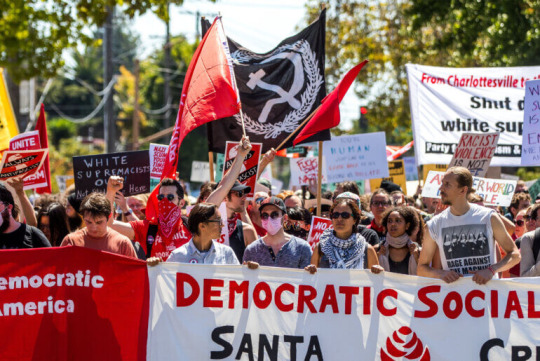
“I became interested in the topic during my undergraduate degree. In the social psychology courses I took, it was clear that there were things you were ‘allowed’ to say and things you were not,” said study author Jordan Moss, a medical student at Sydney Medical School.
“For instance, the blank-slate hypothesis was maintained, and any comments appreciating the genetic contribution to individual or group differences were met with incredible resistance. At the time, I became aware of Jordan Peterson in his opposition to Bill C-16, and examples of ‘controversial’ speakers getting ‘cancelled’ at university campuses were becoming more frequent.”
“Since then, the influence of ‘cancel culture’ has grown to a point where traditional, center left voters appear to feel as if they need to distinguish themselves from those on the extreme, politically correct left. These ideas have real political and societal consequences, and despite their commentary in the media, there was absolutely no data on the psychological traits that contributed to them. This absence of data, the political influence, and societal prevalence motivated the paper,” Moss said.
In the study, 511 U.S. residents completed an online survey that collected demographic information and included assessments of Dark Triad traits, entitlement, political correctness, and White identitarian beliefs.
The researchers found that those who scored higher on measures of psychopathy, narcissism, Machiavellianism and entitlement tended to display more attitudes consistent with political correctness authoritarianism and White Identitarianism, but not political correctness liberalism. In other words, participants who agreed with statements like “I honestly feel I’m just more deserving than others” and “Payback needs to be quick and nasty” were more likely to embrace coercive tactics to achieve social equality or embrace beliefs associated with white nationalism.
“The data indicates that from a Dark Triad perspective, authoritarian political correctness (advocates of cancel culture) have a similar psychological disposition as the extreme, White Identitarian right. While not contributing to their political orientation in the same way that the Big 5 personality traits do, ‘dark’ personality profiles appear to motivate the particular strategies that people use to achieve their ideological goals,” Moss told PsyPost.
“Specifically, people high in trait psychopathy may be more likely to use aggressive methods in pursuit of their ideal. This supports the ‘horseshoe hypothesis’ of politics: though there are real differences that distinguish the average left and right voter, as one moves further from the center, these differences decrease and the similarities of the extreme left and extreme right voter increase.”
“Secondly, the data provides evidence of a clear distinction between liberal and authoritarian political correctness. While political correctness authoritarianism was predicted by Dark Triad traits and entitlement, political correctness liberalism was not. This suggests that the cancel culture rhetoric typical of the so-called ‘regressive left’ does not represent the liberal propensity to care about disadvantaged groups,” Moss explained.
For example, those who scored high on the measure of political correctness liberalism agreed with statements such as “There are no biologically based differences in personality, talent, and ability to reason, between racial groups” and “Lack of protestor resistance does not mean consent to intimate behavior, nor does silence mean consent.”
Those who scored high on the measure of political correctness authoritarianism, on the other hand, agreed with statements such as “It is wrong to criticize the status and rights of women under Islam because it is racist and disrespectful of multiculturalism” and “When a charge of sexual assault is brought forth, the alleged perpetrator should have to prove his or her innocence.”
“While this study provides evidence that authoritarian attitudes can be found on the political left and right, it does not report the prevalence of these attitudes. Further, political correctness appears to be disproportionately advocated by younger generations. Such analysis was out of the scope of the paper and would be incredibly useful,” Moss added.
“I think it is important to note that although differentiating political correctness into authoritarian and liberal subgroups is useful and supported by the data, it does not deny their collaboration. Specifically, political commentators have observed that cancel culture appears to have a disproportionate political influence. It is possible that the compassionate guise of political correctness authoritarianism compels politically correct liberals and traditional liberals to forward the political correctness authoritarianism agenda.”
The study, “The Dark Triad traits predict authoritarian political correctness and alt-right attitudes“, was authored by Jordan Moss and Peter J.O’Connor.
7 notes
·
View notes